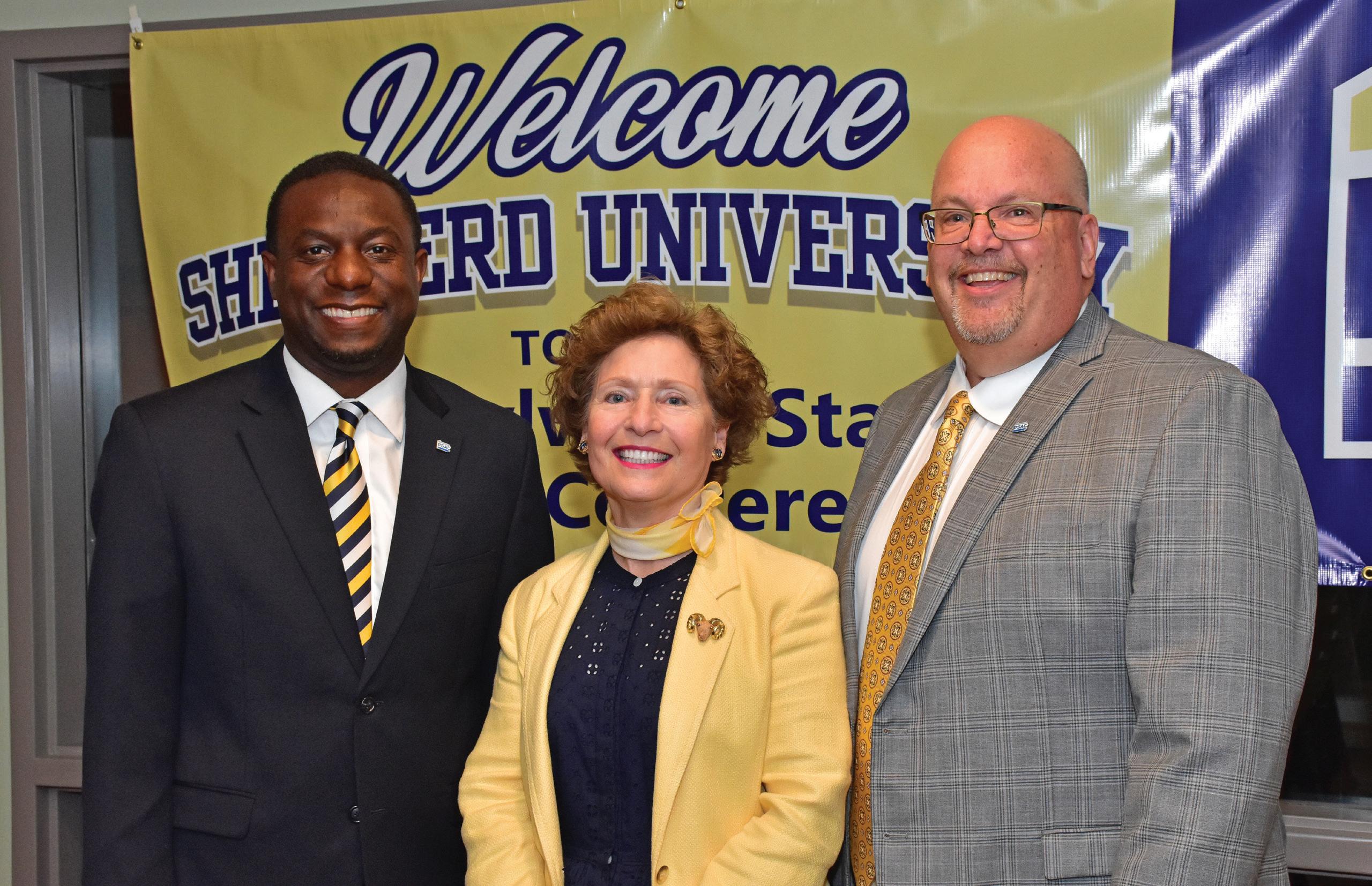M a g a z i n e





Recently, I completed the first two years leading my beloved alma mater, together with a highly talented executive leadership team and exceptional faculty and staff. Those two years provided the opportunity to study the university in a highly detailed way—to learn the strengths, weaknesses, challenges, and opportunities that Shepherd is facing as we near the university’s 150th anniversary in 2021.
Looming large among the challenges is a decline in the high school-aged student population that has impacted many schools nationwide. While Shepherd has been able to maintain strong enrollment numbers from West Virginia residents, the enrollment in our traditional out-of-state markets of Maryland, Virginia, and Pennsylvania has become increasingly competitive. That dwindling market has led to unprecedented competition among colleges and universities—Shepherd is no longer competing with just regional schools for these high school students but with public, private, and proprietary institutions from across the entire Eastern Seaboard.
Also impacting Shepherd is the significant reduction in fiscal support from the state for its public universities. As the lowest-funded public institution among the state colleges and universities—for more than two decades—because of a longtime, unfair funding model, Shepherd has become reliant on tuition, fees, and room and board revenue to fund basic operations.
With these challenges in mind, I convened a Strategic Plan Committee to create a five-year plan that will inform campus decisions and fundraising priorities and result in a strong financial position. The plan, Transforming Our Future–Implementing Change in an Era of Innovation, will focus on four areas: The Shepherd Image, to look at branding and messaging that extols our academic excellence; The Student Experience, to prepare our students for academic growth and a successful career path; The Employee Experience, to recognize and reward our hardworking and dedicated faculty and staff; and The Campus Environment, to establish a financially stable and environmentally sustainable foundation upon which to grow the university.
I asked Bill Sommers, Shepherd’s talented vice president for enrollment management who is known for his analytical approach to problem solving, to lead the Strategic Plan Committee, which was made up of faculty, staff, students, and community members. The resulting plan was approved by our Board of Governors. To follow the recommendations of the approved strategic plan, Bill has assembled four implementation teams comprised of Shepherd’s most thoughtful faculty, staff, and administrators to lend their expertise to the emphasis areas in the plan. The implementation teams, which began work on the plan this summer, will continue their due diligence on the action phase of the strategic plan by setting measures and metrics for the institutional goals as the plan heads toward its completion date in 2023.
The strategic plan is an ambitious one that will require hard work from all team members. One of the things that I learned in my first two years as president of Shepherd University is that our faculty, staff, administrators, and Board of Governors are dedicated, tenacious, and extremely hardworking.
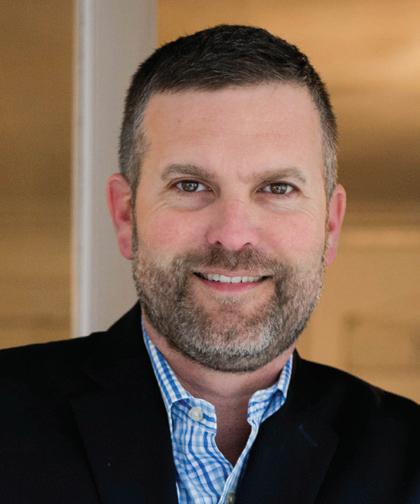
I am proud to say that the implementation of the strategic plan is indeed in good hands! ■
Idon’t remember life without Shepherd. My late father, Dave Lewis ’73, came to Shepherd in 1966 to play football. After a stint in the military, he came back and finished his degree in
1973, shortly after I was born. My mother and father have called Shepherdstown home ever since. I could not be more thankful that they never left. Shepherd University provided me with the education and accounting degree that I have used to build my career and my CPA practice around. I am honored to have been elected chair of the Board of Governors, and I pledge to do my very best to help Shepherd prosper.
Shepherd University is a special place. The setting along the Potomac River adjacent to one of the best small towns in America, historic Shepherdstown, creates an environment that is conducive to learning and encourages a truly wonderful student experience. Our amazing president, Dr. Mary J.C. Hendrix, is leading a wonderful team of faculty, administrators, and staff who are dedicated to student achievement and the advancement of Shepherd. I know, I’m telling you things you already know. You’ve been here. You might still be here. You get it.
What you might not be aware of is what an amazing opportunity Shepherd has right at this very moment. Our proximity to the Washington, D.C., metropolitan area, and in particular to the Dulles corridor, places us just on the edge of an economic boom the likes of which the United States has rarely seen. All you need to do is drive from Shepherdstown to Washington via the VA-267 toll road to see what is happening. We can capitalize on that. We must capitalize on that.
In order to involve Shepherd University in that economic boom, we need to think boldly. We need to do things we have never done in ways we never would have considered. We need our faculty and staff to be creative and yet frugal. We need them to understand the financial constraints we have while thinking of ways to do more with less. We need our executive leadership team to help them and to help guide this wonderful university into its next phase. We need to reach out to private industry to engage them in our future. If we can do all of that, we will see higher enrollments of high quality students, and we will see them graduate and obtain good jobs. We will see higher dorm occupancy rates. We will see more public/private partnerships with more private dollars flowing into the university. We will see more grants being awarded for more valuable research. We will see more engagement by alumni and more alumni and friends donating hard-earned funds to Shepherd. We will be able to retain and recruit top faculty and staff. All of this will lead to the Shepherd University of the future. A regional university that is tapped into the D.C. metro economy and yet true to its professional and liberal arts roots—in West Virginia.
I could not be more excited about the future of Shepherd. I could not be more thankful that President Hendrix came home to lead her beloved Shepherd University. I could not be more proud of the leadership team she has assembled. I could not be more honored to lead such an intelligent and engaged Board of Governors, that cares so deeply about Shepherd and wants to dive in and help in any way they can.
We are going to need everyone to pull together to realize this vision. It can be done, and you can help us get there. Forward! ■
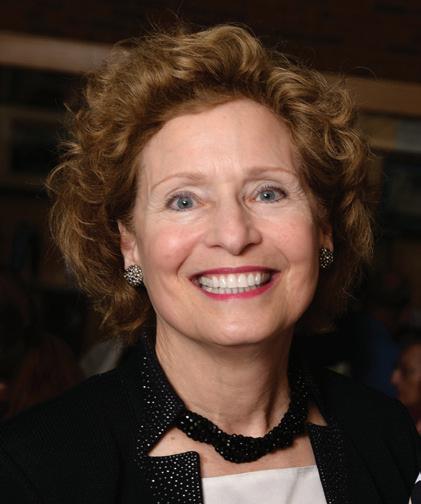 Dr. Mary J.C. Hendrix ’74
Sam Levitan
Eric J. Lewis ’95
Taylor Mendzela
Dr. Mary J.C. Hendrix ’74
Sam Levitan
Eric J. Lewis ’95
Taylor Mendzela
Agriculture program for vets now underway 4
Historians receive $56K NPS grant 5
Scarborough Library receives $100K solar grant 6 Chartwells and Follett come to campus 6 Education program receives CAEP accreditation 7 Shepherd develops new RMI concentration 7 Zacharias is Writer-in-Residence 8 Groff develops beehive sensor technology 9
Dennison ’08 works to revitalize Appalachia 10 Class Notes 12
New Arrivals 13
Outstanding alumni named 14 Weddings and Engagements 15 Obituaries 16
Hall of Fame honorees announced 18 Shepherd to join PSAC in 2019 18 Athletics announces award winners 19 Sports round-up 20
Your gift makes a difference 22 Foundation notes 24 Five join McMurran Society 25
Volunteers lead Popodicon kitchen renovation 26 Women for Shepherd group hosts events 27
Scarborough Lecture Series announced 28 Gala sponsors thanked 29 Leave a legacy: Thomas Lurry 30 145th Commencement 31
The Shepherd University Magazine is published by the Office of University Communications and the Shepherd University Foundation for the Shepherd University community— alumni, donors, students, parents, prospective students, staff, faculty, and friends of the university. A portion of the production cost is underwritten by the Shepherd University Foundation and the Shepherd University Alumni Association.
Editor and Art Director Valerie Owens ’76 and ’86
Managing Editor Monica Lingenfelter
Contributors this issue:
Chip Ransom ’86, Kristin Alexander, Cecelia Mason, Katie Gordon ’12, Zi Wang, Timothy D. Haines ’95, Meg Peterson, Stacy McFarland, BreAnne Rugh ’06, Cathy Nevy, William Ransom, Sam Levitan, Sylvia Bailey Shurbutt
Front Cover:
Back Cover: Shepherd to join the PSAC in 2019.
Photo by Cecelia Mason
ADDRESS CHANGES: Please contact BreAnne Rugh, Foundation database manager, 304-876-5195 or brugh@shepherd. edu.
Eric J. Lewis ’95 Chair Shepherdstown Gat Caperton Vice Chair Berkeley Springs Chad Robinson ’96 Secretary Charleston Ramon A. Alvarez ’62 Charles Town
Christopher S. Colbert ’95 President Shepherdstown
Michael A. Smith ’89 Vice President Winchester, Virginia
Julia M. Connell ’84 Treasurer Charles Town
Karl L. Wolf ’70 Secretary Shepherdstown
Monica W. Lingenfelter Executive Vice President Hagerstown, Maryland
John F. Beatty Martinsburg
Jason S. Best Shepherdstown
Kenneth J. Boone ’76 Baltimore, Maryland
Robert H. Chuey II ’91 Washington, D.C.
Tammy Gill Shepherdstown
Heidi M. Hanrahan Shepherdstown
Mary J.C. Hendrix ’74 Shepherdstown
David Avella ’92 Arlington, Virginia
Marcia K. Brand Martinsburg
Henry Kayes, Jr. Martinsburg
Mona Kissel Classified Employee Representative Martinsburg
Bob Marggraf Great Cacapon
Tia McMillan Shepherdstown
Danielle Stephenson Student Representative Shepherdstown
J.B. Tuttle Faculty Representative Boyce, Virginia
Darren B. Iden ’89 Winchester, Virginia
Brian K. Jackson ’87 Toluca Lake, California
Robert H. Jensenius ’72 York, Pennsylvania
William E. Knode, Jr. ’58 Shepherdstown
Eric J. Lewis ’95 Shepherdstown
Cecelia Mason Martinsburg
Timothy B. McShea ’80 Frederick, Maryland
Andrew D. Michael ’75 Berkeley Springs
Mary Elizabeth “Liz” Oates Shepherdstown Carol Plautz Ranson
Tony W. Price ’93 Shepherdstown
J. David Rickard ’56 Greensboro, North Carolina
Mary Kathryn Robinson Winchester, Virginia
Stephen G. Skinner Charles Town
Jim Auxer ’69 President Shepherdstown
Sandra A. Sponaugle ’95 Past President Shepherdstown
Jennifer Seeley ’06 and ’08 M.B.A. Vice President Shepherdstown
William Baker ’88 Shenandoah Junction
Samantha Brown ’10 and ’14 M.B.A. Charles Town
Lynn Carr ’69 Mt. Airy, Maryland
Christopher S. Colbert ’95 Shepherdstown
David Decker ’89 Martinsburg
Bassell Franks ’12 Martinsburg
Matthew Kradel ’99 Martinsburg
Naim Muhammad ’17 White Plains, Maryland
Rachel Crum Moreno ’08 Harpers Ferry
Robin Moses ’88 Charles Town
Brantley Osborne ’15 Shepherdstown
Francine Phillips ’82 Shepherdstown
TJ Roccograndi ’13 Falling Waters
James Scott, Jr. ’70 Shepherdstown
Kevin Starliper ’91 Martinsburg
Cindy Vance ’88 Martinsburg
W. Gregory Snellings ’91 Frederick, Maryland
Sandra A. Sponaugle ’95 Shepherdstown
Gina Miller Walters ’10 Martinsburg
Alfred L. (Al) Young ’89 Arlington, Virginia
Directors emeriti Ramon A. Alvarez ’62 Charles Town
James A. Butcher Shepherdstown
Kenneth E. Harbaugh Williamsport, Maryland
Jane Ikenberry-Dorrier ’65 Scottsville, Virginia
Jerry P. Kerr ’68 Winchester, Virginia
Elizabeth S. Lowe ’52 Shepherdstown
Allen L. Lueck ’67 Shepherdstown
Susan Mentzer-Blair ’72 Knoxville, Maryland
David T. Newlin ’76 Winchester, Virginia
Gina Miller Walters ’10 Martinsburg
Directors emeriti Jim Auxer ’69 Shepherdstown
Scott Bradford Doleman ’95 Inwood
Robert “Bob” Fleenor ’74 Martinsburg
Paul Hillyard ’58 Winchester, Virginia
Tripp Lowe ’95 and ’97 Shepherdstown
Charles VanMetre ’56 Shepherdstown
Nelson Vazquez ’86 Charles Town
Chris Wooten ’87 Fallston, Maryland
CLASS NOTES may be emailed to alumni@shepherd.edu. The deadline for the spring 2019 issue is November 2. Digital images must be at least 300 dpi.
Alumnus Brandon Dennison ’08, Coalfield Development Corporation founder and CEO. Photo by Cecelia MasonShepherd University has entered into a $600,000, five-year cost-sharing agreement with the U.S. Department of Agriculture Natural Resources Conservation Service (NRCS) to provide opportunities for veterans to become agricultural entrepreneurs throughout the state. The funding will be used to develop conservation systems on the university-owned Tabler farm, located northwest of West Campus, and assist with the development of a new program aimed at training veteran and civilian students to be farmers.
“NRCS is excited to add Shepherd University to a growing list of partners committed to assisting veterans and other students in West Virginia who are interested in a career in agriculture,” said Louis Aspey, the NRCS state conservationist. “The further development and use of Shepherd’s 154-acre farm will help
preserve this land for agricultural use, provide a variety of educational opportunities, help increase local food production, and stimulate economic growth in the state.”
The funding will help cover the cost of installing seasonal high tunnel greenhouses that will extend the growing season, purchasing equipment such as tillers and other implements, and setting up water and electricity. It will also help pay for public outreach and cover the salary for Haroun Hallack, a local organic farmer who will serve as part-time farm manager, instructing and overseeing student projects.
“This is bringing new opportunity to the state and bringing training programs for people interested in smallscale farming and small-scale organic agriculture,” Hallack said. “It’s economically good for the state, the university, and the community.”
Shepherd’s Institute of Environmental and Physical
Sciences is partnering with the College of Business to offer both production and business classes. The production component will focus on the practical aspects of small-scale farming. The business component will cover topics such as marketing, accounting, and business plans.
“The business classes included here will help students plan and evaluate their operations,” said Dr. Ben Martz, dean of the College of Business. “In the end, these courses will provide a leg up to students when looking at the overall feasibility of their farming operations.”
Shepherd’s Regents Bachelor of Arts degree program will offer two emphasis areas, one in agricultural entrepreneurship and another in sustainable food production. There will be a sustainable food production concentration in the traditional environmental studies program. In progress are two, one-year certificate programs,
one in sustainable food production and another in agricultural entrepreneurship.
“We’re going to showcase and teach a variety of sustainable agricultural practices for various vegetable crops,” said Dr. Peter Vila, director of the program and associate professor of environmental and physical sciences. “The program will focus on training students to apply organic and sustainable produc-
tion practices that are suitable for small scale users.”
Vila said the program will use a hands-on approach to provide students with the skills necessary to embark on new career paths in agriculture. The grant will also help Shepherd promote a newly formed partnership with the West Virginia National Guard Patriot Guardens program to offer vets to agriculture training in the Eastern Panhandle.
“Patriot Guardens already has extensive working relationships with two other universities, and this new arrangement with Shepherd will provide veterans and military personnel in the Eastern Panhandle region with training and educational opportunities in farming, agri-businesses, and ultimately agri-therapy opportunities,” said Major General James A. Hoyer, the adjutant general for the West Virginia National Guard.
While the agriculture courses offered at Shepherd would be open to any student, Vila said the university is particularly excited about being able to offer training that will benefit area veterans.
“Shepherd has a strong program to support veterans,” Vila said. “This program will build on existing support systems and offer exciting new opportunities for veterans in the field of agriculture.”

“I am extremely proud of this unique public-private partnership that offers innovative training for the next generation of agricultural specialists addressing critical issues in the sustainable food industry,” said President Mary J.C. Hendrix ’74.
The first courses associated with the agriculture program began during the summer. ■
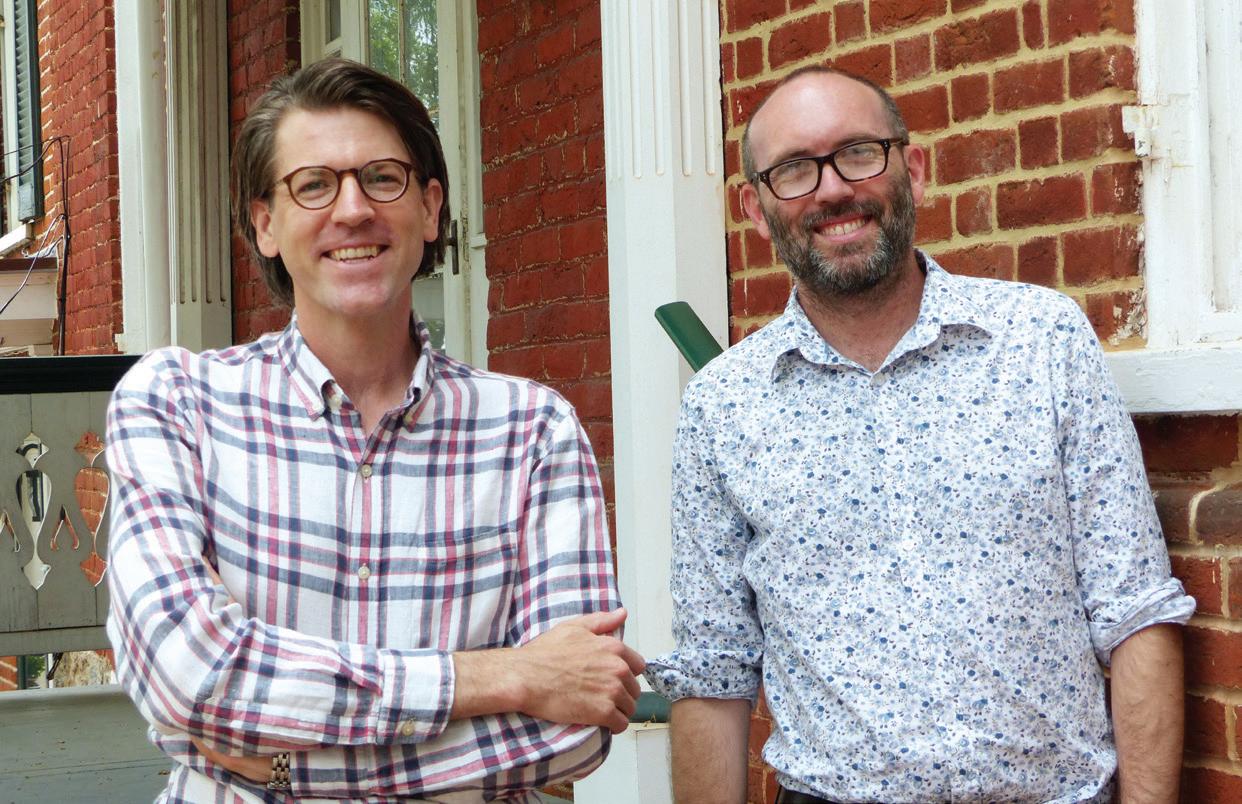
History professors Dr. James Broomall, assistant professor of history and director of the George Tyler Moore Center for the Study of the Civil War, Dr. Benjamin Bankhurst, assistant professor of history, and Dr. Keith Alexander, associate professor of history, are conducting research for the U.S. National Park Service (NPS) due to a one-year, $56,749 contract with the C&O Canal National Historical Park. This is the first contract for Shepherd since the university became a member of the Chesapeake Watershed Association regional segment of a Cooperative Ecosystem Studies Unit under the NPS.
The professors’ research will focuses on the African American experiences at Ferry Hill, Blackford House, and the Bridgeport community. They are developing a historic structures report for Blackford House, a small stone house that dates to the early 19th century located on Canal Road near Lock 38 in the Bridgeport community across the Potomac River from Shepherdstown, and a historic resource study supplemental report for Ferry Hill Plantation, which sits atop the hill overlooking the river.

“The team will take a holistic approach to recovering the lives of the enslaved at Ferry Hill,” Bankhurst said. “We will explore the agricultural, domestic, and industrial contexts of African American life on the site.”
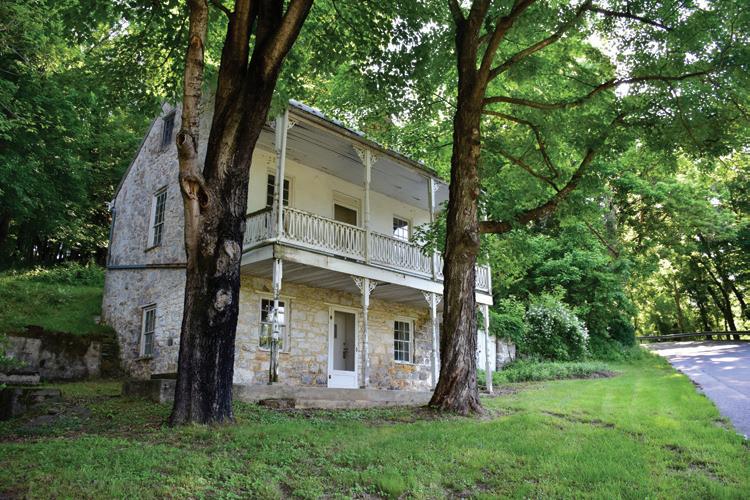
Bankhurst is drawn to the topic of industrial life at the site. “I am keen to uncover how the canal shaped African American life and work at the Blackford House and am excited by the prospect that our work might shape how the site is interpreted in the future,” he said.
The three professors, with the help of some students, are sifting through NPS archives. They are also conducting research at the University of Virginia, Virginia Historical Society, and Library of Virginia. Broomall said these places have repositories that go back to the 18th and 19th centuries and include family estate records.
“The big issue with a project of this sort is that these are non-literate people,” Broomall said. “Recovering the lives of the enslaved is often difficult and in many instances is done through the lens of white audiences, so you’re dealing with a biased archival record to begin with. From there, you have to figure out creative ways to enliven that narrative and recapture a history that’s often lost.”
The project gives the three historians an opportunity to collaborate with each other and NPS frontline interpreters, administrators, and cultural resource managers. It also provides students a chance to help conduct the research.
“Shepherd’s history department and the George Tyler Moore Center for the Study of the Civil War have, over the last decades, developed a robust internship program for our students, and this project further expands internship possibilities within the department,” Bankhurst said. “We have written paid internships into the grant proposal and hope that students who are interested in pursuing a career within the National Parks will take advantage of these opportunities.”
Broomall said students who help with the research will gain real-life experience that complements what they learn in the classroom. “This is asking pragmatic questions of our students,” Broomall said. “Instead of learning about something like plantation slavery in an abstract way, we’re going to be asking students how to interpret in a meaningful way and how to pose questions to audiences that provoke thoughtful discussions. It’s giving them a tangible, hands-on experience—a very essential piece of their education can be achieved through this partnership.”
■ Cecelia Mason LEFT: The C&O Canal National Historical Park’s Blackford House (far left) and Ferry Hill are part of a $56,749 research project undertaken by three faculty members. This marks the first contract for Shepherd since the university became a member of the Chesapeake Watershed Association regional segment of a Cooperative Ecosystem Studies Unit, a national network created by the U.S. Congress to give federal agencies the ability to boost research efforts and expedite projects using expertise from member partners. Dr. James Broomall (l.) and Dr. Benjamin Bankhurst Cecelia MasonThe Scarborough Library received a $100,000 grant from EBSCO Information Services of Ipswich, Massachusetts, for the installation of approximately 170 solar panels on the library’s roof that will generate at least 60 kilowatts of power.
“These panels will be put on a racking system that is slightly tilted to catch more of the sun’s energy,” said Dr. Jeff Groff, chair of the Institute of Environmental and Physical Sciences, who, along with Rachel Hally, library coordinator of collections, wrote the grant.
“This will produce, in money terms, thousands of dollars of free electricity every year,” Groff said. “It’s an investment that’s going to grow over time because energy costs go up every year, and the panels will be up there on the roof largely maintenance free for decades, contributing to energy production here on campus.”
Hally, who accepted the grant award at the American Library Association annual meeting in New Orleans on June 23, said the library uses a lot of energy.
“Because of the size of the building, because of how much IT equipment we have, and because the heating and cooling system has to be really precise to protect our resources, we tend to have more need in terms of HVAC than some other buildings on campus,” Hally said.
The solar panels will be tied into the library’s electric system, and a special meter will monitor how much electricity they generate. That amount will be deducted from the building’s electric bill. Groff estimates over 20 years the panels will save more than $120,000. If energy prices go up, he said, the savings will be more.
The Scarborough Library is one of three libraries receiving solar grants this year from EBSCO, which is a provider of online research content. EBSCO Information Services founder and CEO Tim Collins said the grants are a great way for the company to make an impact on the environment.
“The EBSCO Solar Grants not only help libraries but are part of a larger effort to reduce our collective environmental footprint and demonstrate to local communities the benefits of environmental responsibility,” Collins said.
Groff said the solar array will be accessible to students, who will be able to study it and learn about the technology and the energy it produces. Hally hopes it serves as an inspiration for the community as well.
“Since Shepherd is such an integrated part of town, I’m hoping that residents and community members will be interested in taking a look at and learning more about our installation,” Hally said. “It would be amazing if we saw people taking more of an interest in residential installations after seeing our library installation. It’s just an exciting catalyst for all sorts of environmental sustainability initiatives.” ■
Shepherd students have new dining options on campus for the fall semester. The university has entered into a 10-year contract with Chartwells Higher Education to operate five campus dining facilities and the concessions at athletic events, as well as provide campuswide catering and food for conferences.
Chartwells provides food service to 290 academic institutions across the U.S. The company has developed a comprehensive program that will be implemented at Shepherd over the next 18 months. Changes are planned for the Dining Hall, Ram’s Den, Fireside Bistro, Riverside Café and Market, and Wellness Café.
Chartwells plans to invest $1.9 million in dining facility improvements over the 10-year contract period and will provide annual revenues to Shepherd in excess of $500,000. Some renovation of the facilities began this summer and will continue through next summer.
Starting in fall 2019, the Dining Hall will have a G8 AllergenFriendly Station that will offer menus without the eight most common allergens—peanuts, tree nuts, eggs, milk, wheat, shellfish, fish, and soy. In addition, every meal at each facility will offer vegetarian and vegan options, and students will be encouraged to voice their preferences.
The Ram’s Den will focus primarily on pizza and burgers this year as Chartwells collects feedback on what students want. The Fireside Bistro in the Student Center will convert to a Starbucks. Equipment will be added to the Wellness Café so the fresh and healthy-focused menu can be expanded. The Riverside Market and Café at Potomac Place will offer grab-and-go selections and pop-up menus featuring street-style food. The Riverside Market and Café will also have expanded hours and will serve breakfast. ■
Follett Higher Education took over management of Shepherd’s bookstore in March, bringing new products, savings, and support for bookstore customers. Shepherd selected Follett as the campus retail partner with the best resources, technology, and product selection to support the unique needs of the campus community.
With this new partnership, faculty and students have access to Follett’s expansive inventory of affordable course material choices. Costsaving print options include used books as well as Follett’s text rental program that saves students up to 80 percent compared to purchasing new textbooks. Follett also delivers a varied selection of digital learning technologies that help promote anywhere, anytime access to needed materials. New store services include Follett’s year-round buyback program and price match, which helps ensure students get their materials at the lowest cost possible.
Shepherd’s bookstore is devoted to serving Shepherd students, faculty, staff, alumni, fans, and the local community, offering products and services both in-store and online at www.bkstr.com/shepherdstore/home. The bookstore is located in the Student Center and is open 8 a.m.-5 p.m., Monday through Friday.
Follett is a $3.4 billion privately held company headquartered in Westchester, Illinois. As a leading provider of education technology, services, and physical and digital content, Follett works with 70,000 schools and operates more than 1,250 local campus stores and 1,600 virtual stores. ■
Shepherd’s Department of Education has earned accreditation from the Council for Accreditation of Educator Preparation (CAEP). The seven-year accreditation demonstrates that Shepherd’s programs meet national standards for preparing the next generation of educators.
CAEP is a new accrediting organization. It was formed in 2013 with the merger of the National Council for the Accreditation of Teacher Preparation (NCATE) and the Teacher Education Accreditation Council. Previously, Shepherd had NCATE accreditation. Dr. Scott Beard, provost, said Shepherd is the second institution in West Virginia to go through the self-study process and to have a CAEP site visit.
“We came through with a really clean report,” Beard said. “All standards were met, and we only had some minor areas for follow-up in the annual reporting process. We feel really positive about the outcome.”
To achieve accreditation, the education department had to meet five standards designed to assure that education majors develop a deep understanding of content and teaching methods and can demonstrate an ability to have a positive impact on the learning and development of P-12 students. The department must also recruit quality students, demonstrate the impact graduates have in the classroom, and maintain a quality assurance system to measure data that can be used to improve the program.
Dr. Linda Sell, former director of assessment and accountability, spearheaded the reaccreditation process, working closely with Beard and Dr. LeAnn Johnson, assistant professor of education.
Johnson said meeting some of the new standards will involve collecting data on the children with whom student teachers work in the classrooms. It will also involve tracking Shepherd education students once they graduate and enter the workforce. During the first three years of teaching, graduates will fill out surveys as part of their yearly evaluations.
“We’re held highly accountable to be able to measure student success, not just in their own learning, but also in their ability to impact their future students’ learning,” Johnson said. “Ultimately, the sign of successful teachers is that they are able to actually show that their students are learning. Now we have to figure out creative ways to gather that information.”
“This was our initial accreditation with CAEP, so we are really pleased with the outcome,” Beard said. “Part of the reason we’re pleased is that teacher education is part of the history and the legacy of Shepherd. We were founded as a state teachers college. That has always been part of Shepherd’s identity and reputation. We see many of our alumni out in the field having an impact on the P-12 system, and I think we’ll continue to do that.” ■
ABOVE: Farmers and Mechanics Mutual Insurance, which is headquartered in Martinsburg, requested that Shepherd’s College of Business develop a risk management and insurance program to help address the projected need for insurance professionals. Pictured (l. to r.) are Dr. Ben Martz, dean of the College of Business; President Mary J.C. Hendrix; Dan Otto, senior vice president and chief financial officer, Farmers and Mechanics Mutual Insurance; and Jim Dailey, board of directors chair, Farmers and Mechanics Mutual Insurance.

The College of Business hosted a risk management and insurance (RMI) roundtable discussion in March to discuss with insurance professionals how Shepherd’s new RMI concentration, which began this fall semester, can help train much-needed insurance industry employees. Participants included regional experts.
Shepherd developed the RMI concentration at the suggestion of and with support from Farmers and Mechanics Insurance Companies to help address the projected need for insurance professionals. The U.S. Bureau of Labor Statistics and Jacobson Group, an insurance recruiting watchdog, estimate potentially 400,000 positions will go unfilled. Millennials are not considering going into the insurance field, a trend Shepherd’s College of Business hopes to reverse.
“We are excited about the career opportunities created by this program,” said Dr. Ben Martz, dean of the College of Business. “Our goal is to educate students about the wide variety of careers available throughout the RMI industry. The program will have a set of integrated activities including a scholarship program to help students develop the skill sets needed to succeed in the RMI area.” ■
Dr. Matt Kushin, associate professor of mass communications, gave a keynote address titled “The Cost of Clicks and Shares: Questions on the Civic and Political Potential of the Internet in the Attention Economy” at the University of Aveiro in Portugal for Internet Day 2018 in May.
Kushin, whose research focuses on social media, politics, and civic life, presented information about the impact of social media on society today. In addition to the University of Aveiro, Kushin spoke at the New University of Lisbon. His visit was sponsored by the American Corners Program through the United States Embassy and Consulate in Portugal.
Cecelia MasonWRITER KAREN SPEARS ZACHARIAS, author of the Christian Bend trilogy, is the 2018 recipient of the Appalachian Heritage Writer’s Award, presented by the West Virginia Center for the Book and Shepherd University. She will serve as Shepherd’s Appalachian Heritage Writer-in-Residence from September 21-28. Zacharias is assisting in the selection of the West Virginia Fiction Competition winners and will assist with the preparation of Volume XI of the Anthology of Appalachian Writers.

ome of life’s greatest treasures are born of great sorrow,” asserts Maizee in Karen Spears Zacharias’s book Mother of Rain, the 2018 West Virginia State Common Read. In Burdy, the second book of Zacharias’s Appalachian trilogy, the character whose name is the title of the book repeats this thought in a slightly different tone and under a different set of circumstances. Burdy says of the inevitable tragedies and disappointments of life, “Put your head down and keep walking. Keep breathing. Learn to accept the drenching for what it is and try to find some beauty in it.”
If one were to distill a philosophy from a single event in the life of author Karen Spears Zacharias, it would be the day in 1966 when incoming fire from a missile exploded the early morning silence in Vietnam and took the life of her father, Sergeant David Paul Spears, who was asleep in his tent. Spears was only one of thousands casualties of that war, but the collateral damage caused by his death released a chain reaction that affected the lives of every member of his family.
Zacharias never thought of herself as anything other than a military child, the daughter of a Vietnam War soldier. She always considered Georgia her “home” because it was home to Fort Benning where she still has memories of a family intact and a father alive. Her parents were from East Tennessee in the Appalachian heartland, but Georgia was home. Even when Zacharias left Berry College in North Georgia to follow her mother, brother, and little sister to Oregon, Georgia remained a place to call home. She earned her B.A. degree in communications and education from Oregon State
University, marrying Timothy Zacharias, a native Oregonian, during her senior year.
Zacharias became a journalist, writing for some of the best news organizations in the country, including the New York Times, the Washington Post, Newsweek, the Huffington Post, CNN, and National Public Radio. It was her activism that urged her to serve on the advisory boards for the Vietnam Women’s Memorial Fund and the Vietnam Veterans Memorial Wall Education Center.
In 1997, she was asked to co-write the biography of Georgia family friend and Muscogee County’s first female judge, Rufe McCombs. Her confidence eventually led to publication of After the Flag Has Been Folded: A Daughter Remembers the Father She Lost to War—and the Mother Who Held Her Family Together The book is a family memoir which tells a story oft-repeated among Appalachian families of the region’s contributions to the country’s armed conflicts and the personal struggles of family members and veterans after the conflicts are over. A few years later, Zacharias was encouraged by
crime writer Ann Rule to write A Silence of Mockingbirds (2012), the story of Karly Sheehan, an abused and neglected child who inspired Oregon’s Karly’s Law.
After her story collection Will Jesus Buy Me a Doublewide came out in 2010, it was writer Silas House who encouraged Zacharias to turn the Appalachian story mulling in her mind into a trio of tales, acclaimed books called the Christian Bend Trilogy: Mother of Rain (2013), a Weatherford Award winner, followed by Burdy (2015), and Christian Bend (2017). Zacharias’s writing has been compared to the serious work of Fannie Flagg (Fried Green Tomatoes at the Whistle Stop Café). Dan Morris has said this about Zacharias: “At a time when authenticity seems to be in short supply, Karen provides a genuine voice for things that matter most. Faith, integrity, compassion, and thoughtful patriotism are themes she weaves into a tapestry of transforming . . . stories.”
Zacharias writes and lives today with her family in Redmond, Oregon.
■ Sylvia Bailey Shurbutt7 p.m. “The Writing Life, with Karen Spears Zacharias,” Robert C. Byrd Center for Congressional History and Education.
8 p.m. Karen Spears Zacharias Book Signing and Reception, Robert C. Byrd Center lobby.
3 p.m. Writers Master Class with Karen Spears Zacharias, Robert C. Byrd Center for Congressional History and Education.
8 p.m. Scarborough Society Lecture/Reading and Awards Ceremony, Erma Ora Byrd Hall auditorium. Zacharias will receive the Appalachian Heritage Writer's Award and will present the Scarborough Society keynote and the West Virginia Fiction Competition Awards. A book signing and reception will follow in the Erma Ora Byrd Hall atrium.
For a complete list of residency events, visit www.shepherd.edu/ahwirweb/zacharias/schedule
Dr. Jeff Groff, chair of the Institute of Environmental and Physical Sciences, is exploring new ways to monitor honeybees using technology that measures temperature in the hive.
This spring, Groff established two bee colonies in which he installed a prototype frame embedded with 32 temperature sensors. The sensors wirelessly relay information to an online application that Groff developed.
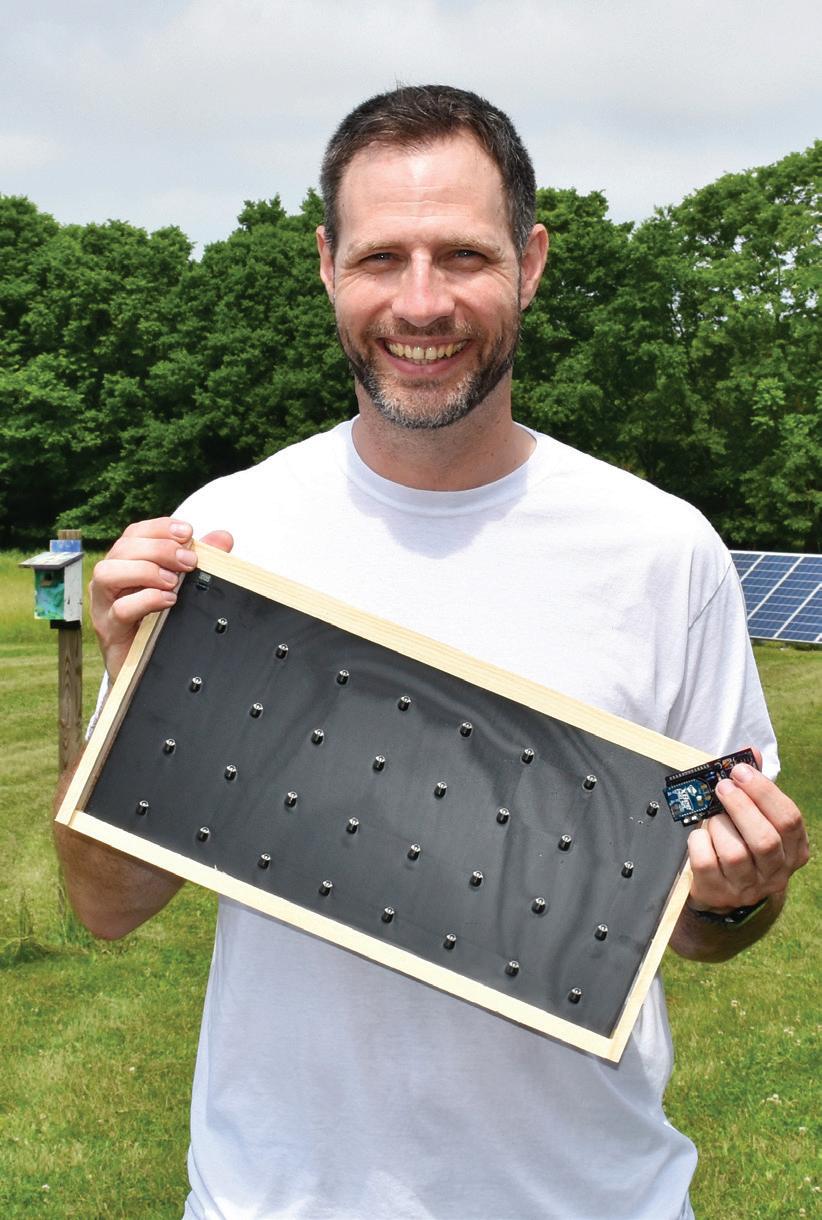
“Bees in the colony are engaged in many different activities, such as taking care of the brood—which are the baby bees (eggs, larvae, and pupae)—food storage, maintenance, and temperature regulation,” Groff said. “This can all be taking place on a single frame in the hive. We expect each of these activities to have different temperature signatures.”
For example, Groff said the brood is kept at a relatively constant temperature between 90 and 95 degrees Fahrenheit.
“If the brood gets too cold, heater bees will start vibrating to warm it up,” Groff said. “If it gets too hot, bees will start fan-
preparing stores for winter, or a queen not doing a good job of laying eggs.”

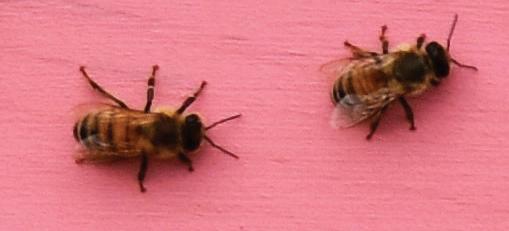
Groff expects students to benefit from working with the bees. He teaches a physical computing class that deals with building electronic sensor systems that can be embedded in an environment to collect data or manipulate that environment. Shepherd’s new concentration in sustainable food production will also incorporate beekeeping, with a goal of establishing an apiary at the uni-
ning to cool it down. They even use evaporative cooling to regulate temperature. Foragers will bring water into the hive, and bees will sit there with little water droplets on their tongues to evaporate.”
The data Groff is collecting should be able to show if brood is present and sufficiently abundant, and thus indicate if the colony has a healthy, productive queen.
Groff said the winter months are the most dangerous time for a bee colony because there’s no food to forage and it’s cold, so the bees cluster together in the hive to stay warm. Using the sensors, he will be able to see a hot spot where they are clustering and determine if they are moving enough to get to their stored honey. Groff said the sensors might be valuable in alerting beekeepers if their bees are going to swarm. This is when a large number of the workers and queen fly away to find a new home once the hive becomes overcrowded.
“There’s probably a temperature signature associated with that behavior,” Groff said. “The pre-swarm activity involves bees doing things like clustering together near the hive entrance and not doing their normal work. There could be an early warning signal that comes out of these types of data. If you know your bees are going to swarm, you can try to prevent it or capture the swarm to start a new colony.”
Starting in the late 1990s, beekeepers noticed the honeybee populations were declining due to factors such as disease, parasites, and pesticide use. Groff hopes the technology he’s developing might help prevent further decline.
“By monitoring the temperatures in a high resolution way, there should be signals that show a colony is weak, giving beekeepers a chance to intervene,” Groff said. “Signs that a colony is getting weak include not putting enough honey away, not

versity’s Tabler farm for teaching and research. An environmental geomatics student is planning to do independent research in the fall that will involve streaming data from beehives into online maps.
“The first phase of this research project is to work out kinks in the prototype and build up to a situation where you have multiple frames in a single hive monitoring temperature so you can get a three-dimensional picture of what’s going on,” Groff said.
Groff hopes his work will eventually help advance our understanding of honeybee health and behavior.
“This is a new instrument, and every time there’s a new instrument in science, new discoveries are made, and often those are unexpected discoveries,” Groff said. “Hopefully some unexpected things will come out of my data.” ■
Cecelia MasonA $500 grant to the Friends of Popodicon from The Monarch Alliance, a program of the Potomac Valley Audubon Society, is being used to purchase plants needed for monarch butterflies to feed, rest, and procreate in Popodicon’s front entrance and formal gardens. Shepherd is one of seven entities that received grants from The Monarch Alliance.
“The aim of The Monarch Alliance is to have as many monarch waystations along the migration route as possible,” said Elisabeth Staro, lead for the Popodicon garden restoration project. “As the butterflies are going through their lifecycle and migrating, they go from place to place to be able to feed and rest. It can be just a little portion of your yard where you plant some butterfly weed or something to help and nurture them so they can make their long journey to Mexico.”
ABOVE: Dr. Jeff Groff, chair of the Institute of Environmental and Physical Sciences, is designing prototype beehive frames embedded with temperature sensors to monitor his hives. Shepherd receives grant to help monarch butterflies Cecelia Mason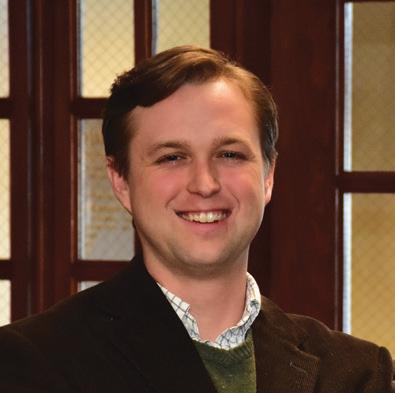
Moyers & Company, West Virginia Public Broadcasting, CNN, and the Starbucks original series Upstanders, as well as in the Chronicle of Philanthropy, Wall Street Journal, and the 2014 National Geographic documentary From the Ashes.
In 2010, Brandon started the Coalfield Development Corporation, a family of social enterprises that blends the efficiencies of the for-profit world with the compassion of the nonprofit world.


“We feel that the main economic problem in Southern West Virginia is that the economy is not diversified, so we want to show what a diversified economy could look like,” Brandon said. “That’s why we’re into so many different things.”
Brandon built Coalfield Development on a business model with three bottom lines—financial, social, and environmental. Coalfield Development raises money through grants,
toward an associate’s degree in applied science. They spend three hours in personal and professional development, learning skills in money and time management and communication. When it started in 2010, Coalfield Development hired three people. In the past eight years, more than 30 have graduated and about 55 are currently enrolled in the program.
The seeds for Coalfield Development Corporation were planted while Brandon attended Shepherd, which he chose because it was as far away as he could get from where he grew up near Huntington without having to pay out-of-state tuition.
“Two classes at Shepherd were really impactful,” Brandon said. “I had West Virginia history with Dr. John Stealey, which helped me understand why things are the way they are in West Virginia—how coal became king and how our politics developed. Another was on the political science side, an urban policy class with Dr. Denis Woods. In that class, I learned what a community development corporation is. I felt that was a model that could really make a deep impact on people’s lives.”
based solar projects.
“The good news is we’ve created more than 100 jobs,” Brandon said. “The bad news is the job losses have been so dramatic that it’s only a drop in the bucket.”
But Coalfield Development has achieved at least one of its goals—pioneering a new way to create economic development and a better quality of life in a part of the country that has long been dependent on coal.
“We have become a leader in a new story for central Appalachia that is not ‘woe is us’ and ‘what poor impoverished people we are,’ but look at this group of people in the southern part of the state who have come up with some new and fresh ideas and are making a go of it being active, engaged, and creative,” he said.
Those hired by Coalfield Development are called crewmembers. They participate on the 33-6-3 model—spending 33 hours a week working at one of the social enterprises and taking six hours of classes each week at a community college, working
While attending Shepherd, Brandon worked as the youth director at the Shepherdstown Presbyterian Church. The last service trip he led for the church, which involved taking a group of volunteers to Williamson to perform community service, also inspired him. While the group was doing a home repair, two young men with tool belts approached and asked for work. Brandon had to explain there was no work because they were volunteers.
“It was a small moment but it really haunted and stayed with me,” Brandon said. “I felt like it summed up the situation in West Virginia. We have people who want to work, to learn, and to be a part of something, but there’s nowhere for that gumption to be applied. That was really a spiritual seed for me to start thinking about what I could do to help solve that problem.”
After graduating from Shepherd with a B.A. in history and a B.S. in political science, Brandon earned a Master of Public Affairs degree with a concentration in nonprofit management as well as a certificate in social entrepreneurship from Indiana University Bloomington. He attended graduate school to learn how to start a nonprofit community development corporation with the intent of moving back to Southern West Virginia to make a difference.
“There have been so many governmental programs and so many charitable efforts,” he said. “Some have worked pretty well, but here we are several generations later, and Southern
fundraisers, sales, and contracts. It trains people through its five social enterprises—Reclaim Appalachia, which finds a use for mined land; Rediscover Appalachia, which deconstructs old, abandoned buildings and uses materials from them to make furniture and other products; Refresh Appalachia, which trains people in innovative sustainable agriculture; Revitalize Appalachia, which offers on-the-job training to renovate dilapidated buildings; and Rewire Appalachia, which coordinates communityWest Virginia is still pretty well stuck with the same challenges we had three or four generations back. I felt social enterprise was a new approach that could be more effective.”
Through Coalfield Development, Brandon continues his association with Shepherd. For the past two years, the organization has hosted Alternative Spring Break, where stu dents spend the week performing community service. Coalfield Development has also hired an intern from the College of Business, rett Carrico ’18, and is renting a space in Shepherd’s Applied Business Center. Garrett, a current M.B.A. stu dent, created a business plan to find Eastern Panhandle-area venues to sell products made through the Rediscover Appalachia program at the Big Ugly Woodshop in the Big Ugly Community Center and Saw’s Edge Woodshop in Huntington. Most of the products are home décor, such as end tables, coasters, wall hangings, and stained glass.
“The products are beautiful,” Garrett said. “They use gorgeous material, a lot of reclaimed wood, and the finishes are great. The reclaiming of the wood is my favorite aspect of it because it really stands out and shows West Virginia’s heritage.”
Garrett, who has volunteered at nonprofits in his hometown, said it has been interesting to work with an organization that is both not-for-profit and for-profit.
“I would say Coalfield Development is successful in multiple ways and definitely in terms of revenue, awareness, and contribution,” Garrett said. “It is a unique company that is growing. There are a lot of different markets they have their hands in at different levels. There’s room for expansion. They provide opportunity for a lot of folks and at different levels of entry. You don’t have to be qualified; you just have to be willing to learn.”
Just as he’s glad to make a contribution to the economy in the region of the state where he grew up, Brandon said he’s happy to stay connected to and support Shepherd.
“I’m really proud to be a Shepherd grad, and I very much feel invested in the university,” said Brandon, who lives in Wayne with his wife, Ashley, and son, Owen. “I can honestly say I had a great experience here. It really did create a foundation for me to be thoughtful, to be a problem solver, and to be community minded. Just like all of West Virginia, I want to see Shepherd reach its full potential, power, and purpose. That’s our vision statement. I think as a key anchor institution in West Virginia, it’s important to our state’s wellbeing that Shepherd does well.” ■ Cecelia Mason

isolation was surprising to some, but they quickly adjusted and in some cases found something to appreciate. English major HannaH BrumBaugH ’18, a secondyear Alternative Spring Break participant, came to enjoy being away from cell phones and the hurly-burly of campus life.
“Last year I really struggled not being able to message people, but this year I enjoyed not being able to reach the outside world,” Hannah said. “I found peace being unplugged.”
The students worked at a strip mine reclamation project where farming now takes place. The farm seeks to reclaim the land by alternating different grazing animals on the depleted soil left from the mining process.
Interestingly, the strip-mining farm reclamation site is directly across the valley from a current strip mine, where blasting on the mountain continued throughout the day. One of the students quoted Brandon, who was telling them about the farm while pointing toward the strip mine across the valley. “That’s the past,” Brandon said, “and this is the future.”
The Shepherd students spent time working at an abandoned school that is being transformed into a civic center and artisan site where residents take part in Coalfield Development’s 33-6-3 business/educational model. The program affords out-of-work coal miners and others in the community the opportunity to work for hire on these reclamation projects while retooling their own skill sets through community college credits.
Shepherd graduate student Jan stevens ’18 m a., whose husband Jim accompanied the group, worked on one of the construction projects installing flooring with a young man named Dakota. Jan was impressed with the young man, who had garnered, while working for Coalfield Development, a number of certificates, including one in welding.
“Dakota is a shining example of the execution of Brandon’s vision to rebuild the Appalachian economy,” Jan said.
Brianna maguire ’18 remembers one young man who made an impression on her. He was one of the crewmembers who had actually secured a good job outside the region, but when he saw the devastation the opioid epidemic was having on his home, he chose to return to West Virginia, work with Coalfield Development, and get a degree in law enforcement.
“Because of men like him, I felt a strong desire to stay and help, too—though to be perfectly honest, a year or so ago I would have been more than willing to pack up and leave as early as possible,” Brianna said. “Now I feel like I want to stay here, at least for a little longer, and try to contribute to the regrowth of our region.”
Brianna said taking the trip to Southern West Virginia for Alternative Spring Break gave her a more realistic view of Appalachia.
“In classes at Shepherd, it’s easy to become overwhelmed because of all the problems Appalachia has faced in its history—the taking of lands, loss of jobs, opioid epidemic, civil and mine wars, and poverty of the region seem like evidence that the region is in a state of crisis,” Brianna said. “After going on Alternative Spring Break, I no longer feel sorry for the region. Instead I feel proud that our people have faced all of those issues and decided to fight for a better future. Instead of suffering, I see resilience—instead of fear, strength.”
■ Sylvia Bailey ShurbuttWilliam “Bill” Funk was honored when the Robert E. Aylor Middle School gymnasium was dedicated in his name. Bill retired at the end of the 2012-2013 school year after 43 years of teaching at Aylor Middle. He was there when the school was still under construction and was the first physical education teacher to walk the gymnasium. He also coached wrestling, football, and track, bringing home many championships. The Frederick County, Virginia, School Board approved naming the Robert E. Aylor Middle School gym and athletic facilities the William “Bill” Funk Athletic Center in October 2015, but the dedication did not happen until this year.
’80 , and is father to Daniel “Clay” Anders ’07.
Clayton Anders has completed his 33rd season as head football coach at Boonsboro High School in Maryland. On October 21, 2017, he became the winningest coach in Washington County, Maryland, when the Warriors defeated Concordia Prep 55-26 for his 206th victory. He was also named the Herald-Mail Coach of the Year for the sixth time. His record stands at 208141, and his Warriors have advanced to the state playoffs 13 times. In December 2017, he was notified that he would be inducted into the Maryland Football Coaches Association Hall of Fame Class of 2018. The ceremony took place at halftime of the Red-White University of Maryland 2018 Spring Football game at Byrd Stadium. Clayton is the fourth winningest active coach on the Maryland State Football Coaches Association list, and 18th on the all-time wins list. He is married to Dana Hendricks Anders
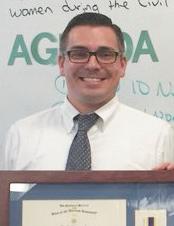

’75
Tammy Aaron, of Clear Spring, Maryland, has been elected to the Brethren Mutual Insurance Company’s board of directors. She is the youngest board member currently serving. Tammy joined Brethren Mutual as an accountant in 1993. She was promoted to assistant treasurer in 1995, elected as board treasurer in 1999, and named vice president of finance in 2002, later being promoted to chief financial officer. In 2015, Tammy earned the title of chief risk officer, and last year she was elected to serve as both board treasurer and corporate secretary. In addition to her board duties, Tammy oversees Brethren Mutual’s accounting and human resources departments. She earned her bachelor’s in accounting from Shepherd with a minor in mathematics and became a certified public accountant in 1991.
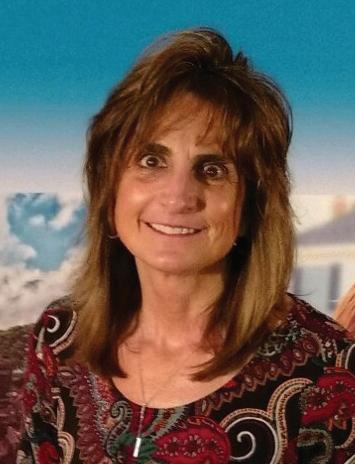
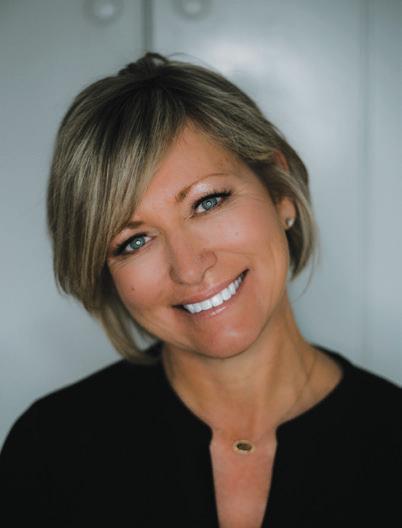
in Business at the University of Illinois Champaign/Urbana. The sculpture and pedestal are 68 inches tall and weigh approximately 1,200 pounds. Coordinate Harmony was chosen because it personifies the spirit of the Irwin Center. The meaning behind the sculpture’s name comes from the music of the Renaissance in which a series of harmonies interweave to form a melody; if one of these harmonies is removed, the melody suffers. This applies to the Irwin Center as the organization’s members are the individual harmonies that form the overall melody of the organization as a whole. Carl has been a Martinsburg resident for more than 30 years and a full-time sculptor for more than 17. He hand-carves each of his pieces and prefers working in stone because it can be displayed both indoors and out and is a nontransitory medium that does not fade, wash away, or break like other mediums.
Joy Osbourn Lewis was named the manager of business retention and expansion for the West Virginia Department of Commerce in January. In her new position, she works on economic development issues with companies that are considering moving to the Eastern Panhandle of West Virginia. Previously, she worked as the regional representative for former Governor Earl Ray Tomblin. Joy is married to Eric Lewis ’95; they live on their farm in Shepherdstown and are parents to Chandler, 22, and Maclaine, 21.
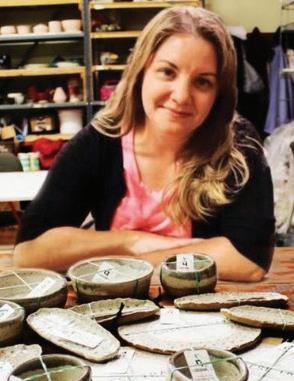
’96 Carl Wright, of Martinsburg, installed his abstract stone sculpture, Coordinate Harmony, at the Irwin Center for Doctoral Study
Justin Humphreys has been appointed Airstream Inc.’s new chief operating officer (COO), previously serving as the company’s vice president of sales. As COO, Justin oversees sales, service, parts, engineering, production, finance, purchasing, and human resources. Airstream hit a new sales record in each of Justin’s seven years as vice president of sales. He was responsible for overseeing parts and service, which have also grown substantially under his guidance. Recently, he led the successful implementation of the Five Rivet dealer standards program, designed to improve the customer ownership experience through Airstream’s dealer network. Justin graduated from Shepherd with a degree in business administration and has been in the RV industry for 20 years.
’69
’98
Lesley Quesada, of Waynesboro, Pennsylvania, had a collection of her pottery available for purchase at Pennsylvania Bon-Ton stores. Lesley graduated from Shepherd with a degree in fine arts and works full-time as a graphic designer. She didn’t plan to become a professional potter, but a friend convinced her to take a class at the Nicodemus Center for Ceramic Studies and she fell in love with it. In addition to her fulltime job, Lesley has four children and says she uses the time after they go to bed to play catch up. She typically spends about six hours a week in the studio.
Lesley noticed an announcement that Bon-Ton was looking for artisans through an online sourcing fair to submit products to be sold in the Close to Home shop, an in-store shop that celebrated the best of Pennsylvania with a selection of specialty products and items sourced from nearly 300 local makers. These shops started in 2016 and were so successful that they were included in 180 stores through the Bon-Ton chain. Lesley’s designs were officially accepted in June 2017 and she received her first order in November, to be completed within two weeks. Her collection included a cheese and cracker plate, Brie baker, and a soap dish. Her work has been described as beautiful, yet functional. Her work was found in stores in Hanover, York, Lancaster, Allentown, and Doylestown.
Battlefield , co-written with Terry Barkley, published by Savas Beatie LLC. While few people know much about the church and its role during and after the Battle of Antietam, this is the first booklength study of its kind based on years of research from both a National Park Service and Church of the Brethren (Dunkers) perspective. Alann spent 16 years as a park ranger at Antietam and has earned degrees from Shepherd, University of Pittsburgh, Shippensburg University, and Pittsburgh Institute of Mortuary Science. He currently serves as a pastor for the Churches of God.
Hans Fogle has been named public information officer for Jefferson County Schools. Hans previously worked for radio stations WEPM, WLTF, and WICL, based in Martinsburg and part of the West Virginia Radio Corporation. Hans received his Bachelor of Science degree in mass communications from Shepherd.
James (Erik) Sassak ’05 received the Teacher of the Year award from the Fairfax Resolves Chapter of the Virginia Society, Sons of the American Revolution. In April, the chapter president and other members presented him with the award in front of his class at Brambleton Middle School in Ashburn, Virginia.
lish language arts curriculum. Jessica’s students were asked to present the ASA Conference Plenary, “If You Ask Us,” the first time the Appalachia Studies Association has done such a program in lieu of a plenary speaker. Jessica and her students also presented a pedagogy session at the conference that explored the importance of Appalachian literature and history in their classes. Jessica noted that she was exposing her advanced placement composition students to images of themselves in literature. Her use of the books of Shepherd’s Appalachian Heritage Writers-inResidence improved her students’ success in their course and in their school work, leading many of these high-achieving students to say that they would like to return to the state after their college education is completed. She received the award at the April 6 ASA Awards Banquet.
Tyler Kolb was recently promoted to branch manager of United Bank’s Spring Mills location, where he oversees the profitability of the location, hires and coaches employees, and promotes the bank’s products and services. Tyler said he picked up valuable experience at his first job with the Martinsburg Chick-fil-A when he was just 16 years old, working his way up to operations director eight years later.
’00
Penny Kay Hoeflinger, founder of Coffee House Farm, worked with a friend on writing a play from a workbook of their design called Avoiding the Octopus, to help educate the young and elderly on the trappings of human trafficking. In January, the play was performed at Shepherd’s Reynolds Hall, with performances taking place in other communities and states. Penny Kay said she wants audiences to see and feel how traffickers lure a young person into their web of slavery and to understand that without strong family and community connections, traffickers can convince the young person they are the only ones who care about them.
Alann D. Schmidt has a new book titled September Mourn: The Dunker Church of the Antietam
Jessica Salfia, a teacher at Spring Mills High School in Berkeley County, received the Appalachian Studies Association (ASA) K-12 National Teaching Award, the Stephen L. Fisher Award for Teaching, for introducing Appalachian literature into the Eng-
He joined United Bank in November 2015 as a sales representative, moving into a corporate trainer position, then becoming branch manager. He is a member of Berkeley County Chamber, Rotary International, Leadership Berkeley, and business partner with Spring Mills High School. ■
Dana Salas Norris ’08 and husband, Drew, a son, Dean Bryce, born March 16, 2018.
James (Erik) Sassak ’05 and wife, Sarah, a son, John, in October 2017. He joins big brother Andrew.

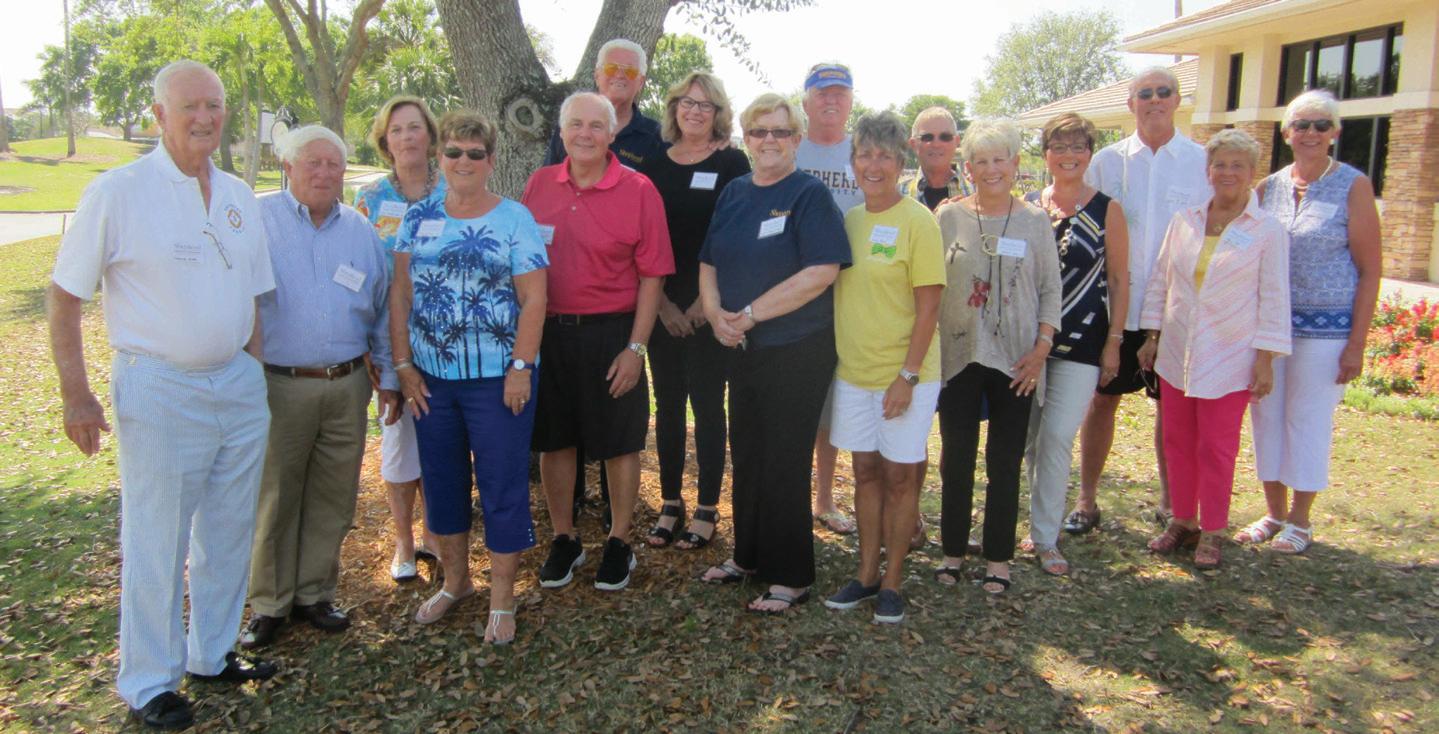
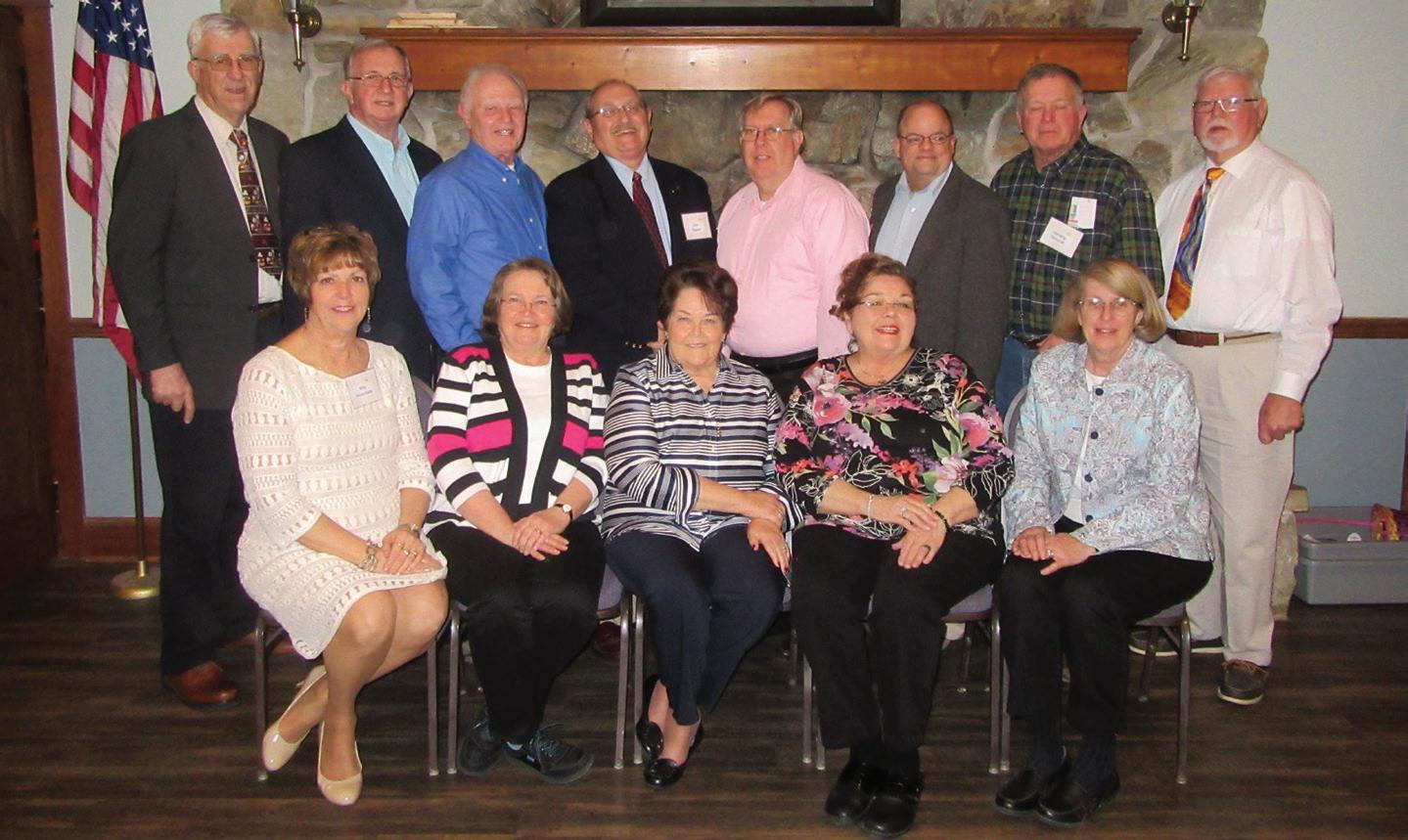
Aregional alumni community is a Shepherd alumni group within a specific geographical region that promotes personal and professional opportunities for lifelong connections to Shepherd and to fellow alumni. Communities are led by active volunteers/alumni ambassadors who plan and promote activities and services meaningful to their community. Community activities include social, cultural, and educational events, community service projects, and networking opportunities.
If you are interested in becoming a regional alumni ambassador, contact Kim Hutto, director of alumni affairs, at khutto@shepherd.edu or 304-876-5157.
The recipient of the 2018-2019 Outstanding Alumna of the Year is Francine Phillips ’82. The members of the inaugural class of the Alumni Association’s Finest Under 40 are Jennifer Seeley Flora ’06 and ’08 M.B.A., Brandon Dennison ’08, Elizabeth McCormick ’14, and Tamia Hardy ’16 and ’17 M.B.A.
The outstanding alumni will be recognized during Homecoming, September 27-29 (see schedule on next page)
To nominate candidates for next year’s Outstanding Alumnus/Alumna of the Year and Finest Under 40, visit the Alumni Association website at www.shepherd.edu/ suaa/alumni-recognition-programs and click the link to download the criteria and nomination form. Submit the form with a short write-up about why your nominee deserves the award by e-mail to Kim Hutto, director of alumni affairs, khutto@shepherd.edu or by mail to Shepherd University Alumni Association, Attn: Kim Hutto, P.O. Box 5000, Shepherdstown, WV 25443. ■
Arden Cline ’21 models a new Ram Band uniform purchased through a joint effort by the Shepherd University Alumni Association and the Foundation’s Shepherd Success Fund. The uniforms will debut at the first home football game on September 15 against Glenville.
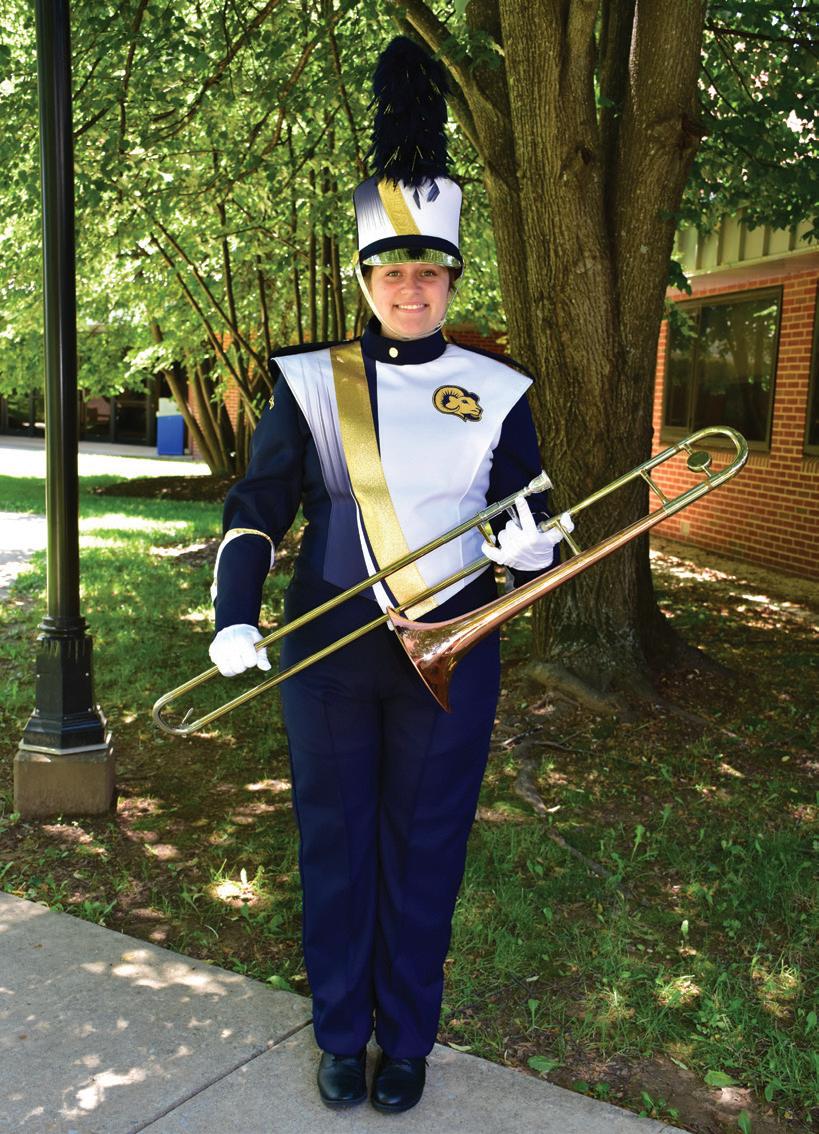
Outstanding Alumna of the Year and NEW Finest Under 40 Reception
5:30 p.m. | Erma Ora Byrd Hall Atrium
Honoring the new 2018-2019 Outstanding Alumna of the Year, Francine Phillips ’82, and the first class of Finest Under 40, Elizabeth McCormick ’14, Jennifer Seeley Flora ’06 and ’08 M.B.A, Brandon Dennison ’08, and Tamia Hardy ’16 and ’17 M.B.A. Event information and RSVP capability is available online at www. shepherd.edu/suaa/upcoming-events-2.
27th Annual Alumni Association Golf Tournament
8 a.m. | The Club at Cress Creek.
For more information on registration or sponsorships, please contact the Office of Alumni Affairs at alumni@shepherd.edu or 304-876-5524.
Founders Day Celebration
3 p.m. | McMurran Hall
The parade will start at McMurran Hall and end at Potomac Place for a short program and reception.
First-Ever College of Business Reunion Dinner
5:30 p.m. | Erma Ora Byrd Hall Atrium
Business undergraduate and graduate alumni are invited to a reception to include beer, wine, and a buffet dinner. Event information and RSVP capability is available online at www.shepherd.edu/suaa/upcoming-events-2.
Ram Band Reunion
8:45 a.m.
Ram Band alumni are invited to play during pre-game and in the stands for Homecoming 2018. To register, please visit www.shepherd.edu/suaa/upcomingevents-2 and click the REGISTER link under the event details, or call Dr. Scott Hippensteel at 304-876-5129.
Alumni Breakfast
9 a.m. | McMurran Hall Lawn
Breakfast is complimentary and is hosted by the Shepherd University Alumni Association and the Shepherd University Foundation.
Homecoming Parade
10 a.m. | German Street
Featuring Francine Phillips ’82, 2018-2019 Outstanding Alumna of the Year.
Applied Business Lab Open House
10:30-11:30 a.m. and 3-4 p.m. | Lower Level of the Dining Hall
Homecoming Game: Rams vs. Concord Noon | Ram Stadium

Alumni Association Homecoming Post-Game Party
3 to 7 p.m. | Town Run Tap House and Community Pub
The Alumni Association welcomes alumni and friends to celebrate with us after the game, win or lose. No admission fee. Must be 21 to drink!
ABOVE: Benjamin Smith ’04 and Danielle Carpenter were married at Saint Francis Xavier Catholic Cathedral in Parkersburg on May 6, 2017.
BELOW LEFT: Anna Lafferre ’06 married Joe Kraft on June 9, 2018. Their wedding took place at Our Lady of Fatima Catholic Church in Huntington. The couple now resides in Atlanta, Georgia. Taking part in the wedding was alumna Catherina Daniel ’06.
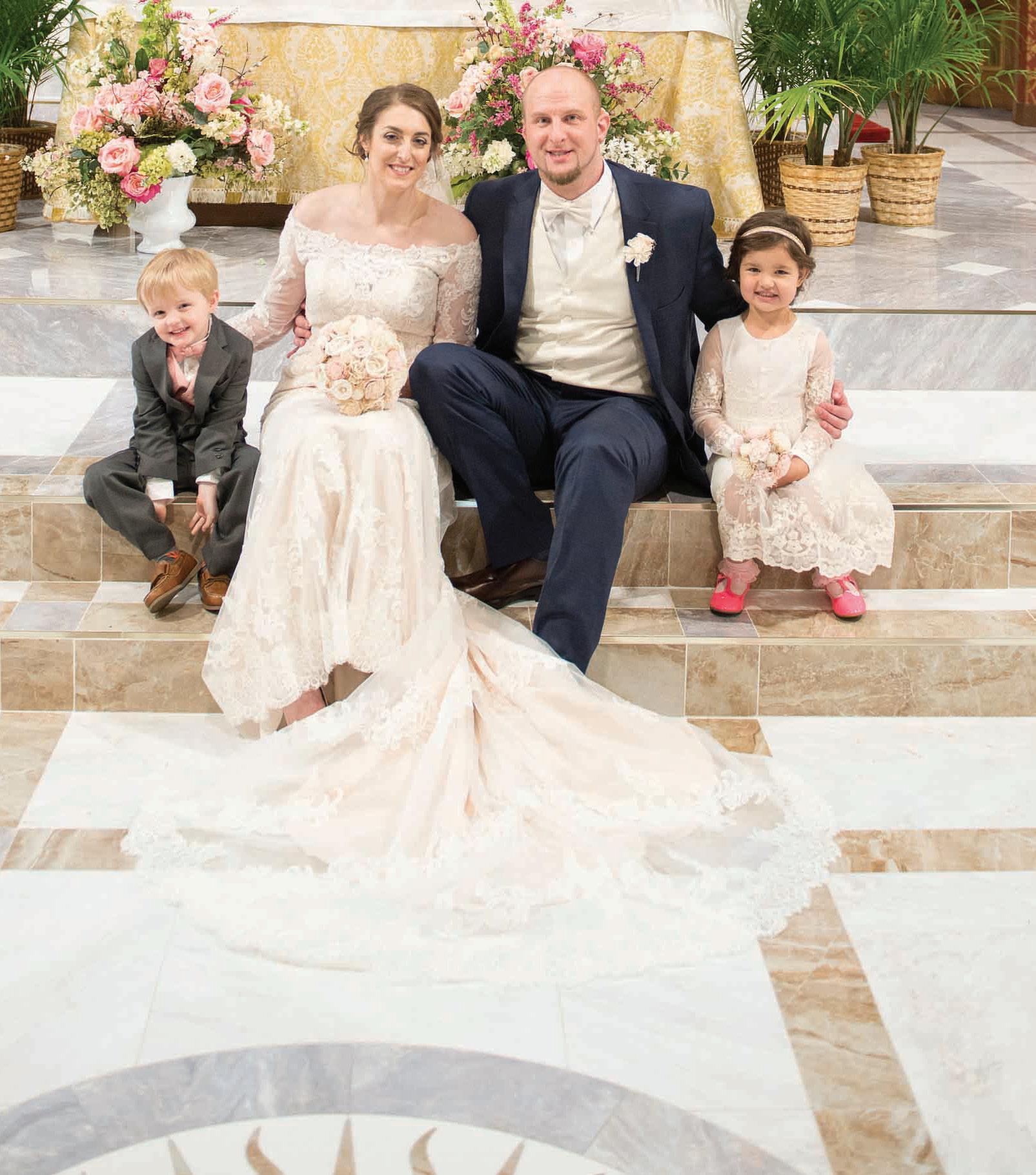
BELOW RIGHT: Benjamin Franklin ’15 and Samantha Mellott ’17 were engaged December 2, 2017 in Gettysburg, Pennsylvania. An August 25, 2018 wedding is planned in Shepherdstown.
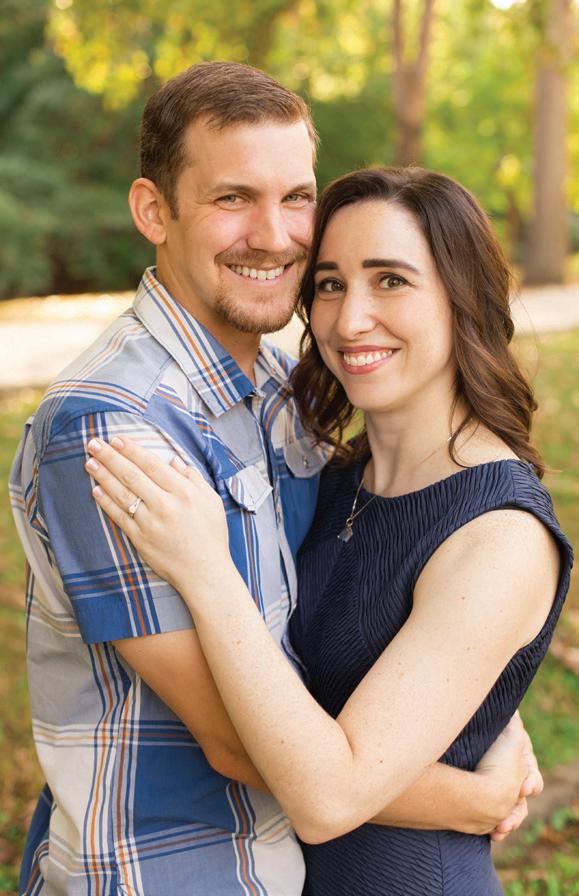

Joseph Russell “Joe” Higham, Jr. ’52, of Georgetown, Texas, died November 1, 2017. He entered the United States Navy during World War II at age 17 before completing his senior year of high school. He was assigned to PC-618, whose missions included search and destruction of German submarines in the North and South Atlantic and the North Sea, as well as the Normandy invasion, leading other ships to Omaha Beach and serving as a guide post as the first waves of landing craft approached before dawn on D-Day. PC-618 also recovered bodies and later buried them at sea after the siege and spent the remainder of 1944 patrolling the Normandy coast for enemy submarines. Joe participated in search and rescue of survivors and recovery of the dead from a torpedoed Belgian ship that was carrying U.S. Army troops, personally saving 18 men.
He was discharged after the war to Newton D. Baker VA Hospital in Martinsburg, where he learned about Shepherd College and enrolled in 1948. He received his undergraduate degree in biological sciences and earned four letters as a celebrated offensive and defensive end for the football team. He then enrolled in graduate school at the University of Maryland, receiving his master’s degree in marine and fresh water biology. Joe went on to a 25-year career with the U.S. Department of the Interior’s Fish and Wildlife Service, serving in several states in both salt and freshwater biology, before retiring from his position as director of environmental impact studies in Galveston, Texas.
Upon retirement, he and his wife of 66 years, Ann, whom he met at Shepherd, traveled the country in their motor home before finding Pendleton, South Carolina, where they lived until 2008, renovating their home, relaxing on the porch, and using the fitness and wellness programs at Clemson University. Joe and Ann then returned to Texas and settled in Georgetown. Joe is survived by his wife, children, and grandchildren.
Robert Benjamin “Bob” Bartgis ’53, of Hedgesville, died January 3, 2018. After receiving his undergraduate degree in education from Shepherd, Bob went to graduate school at West Virginia University. He served in the U.S. Air Force Air Weather Service and was employed at the Engineering Photography Section of Fairchild Aircraft. Bob spent many summers with the West Virginia Division of Natural Resources, supervising youth work programs at Sleepy Creek Wildlife Management Area. He was a retired educator from Berkeley County Schools, teaching science and social studies at Musselman High School, Marlowe Elementary, and North Martinsburg Middle schools. He was a member of Tomahawk Presbyterian Church, where he was an elder, clerk of the session, Sunday school teacher, treasurer, and member of the choir. He was a trustee of the Tomahawk Cemetery, past president and charter member of the Tomahawk Ruritan Club, and member of the Berkeley County Retired School Employees, Berkeley County Historical Society, and The Nature Conservancy of West Virginia. Bob enjoyed sharing his stories about growing up in a log cabin and hunting turkeys, bobcats, and deer. He is survived by his wife, and two sons, Robert Michael Bartgis ’75 and Rodney L. Bartgis ’81
Jackson Kasper “Jack” Jenkins, Jr. ’57, of Frederick County, Virginia, died January 21, 2018. Jack graduated from Shepherd with a degree in business administration and went into the restaurant business with his parents and wife, operating the Shawnee Restaurant, Jumpin’ J, and Jolly Jack’s Drive-In Restaurant. He was enthusiastic in his many businesses and enjoyed raising quality fresh vegetables. He and his wife owned and operated Raspberry Ridge Farms, and they participated in the organizing of the WinchesterFrederick County Farmers Market in 1975. Jack also became the manager of Battery Mart in Martinsburg. He was a 60-year member of the Winchester Hiram Masonic Lodge 21, a member of the Fairview Lutheran Church in Gore, Virginia, and an honorary member of the Hoppers Auto Club. He was a United States Army veteran, having served at Fort Knox, Kentucky, and Fort Meade, Maryland.
Barbara Jean Smith ’59, of Strasburg, Virginia, died May 2, 2018. Barbara was born in Shepherdstown and was a family and consumer sciences major while attending Shepherd. An active member of St. Paul Lutheran Church, Barbara retired from working with the City of Winchester at City Hall and loved gardening.
Thomas M. Palamar, Sr. ’61, of Hagerstown, Maryland, died June 4, 2017. Thomas worked as a physical education teacher and later as a vocational evaluator for the Washington County Board of Education and was one of the first four people to be appointed as a school vocational evaluator in the state of Maryland in 1970. He also served as a vocational rehabilitation counselor with the State Department of Vocational Rehabilitation in Hagerstown for four years. Thomas was a member of the B.P.O. Elks #378, Eagles Club Inc. of Waynesboro, Pennsylvania, American Legion Post #42, AARP, Washington County Sports Hall of Fame, and the Eagles Inc. Travel Club.
He played professional baseball with the Washington Senators and Minnesota Twins farm systems, and enjoyed playing fast-pitch softball and tennis locally, as well as singing and entertaining. Thomas also served a tour of duty in Korea.
Seymour Richard Thomas ’62, of Berkeley Springs and formerly of Washington, D.C., died June 15, 2017. Richard was a U.S. Army tank commander. He studied at American University prior to coming to Shepherd to finish his degree, graduating with a Bachelor of Science degree in business administration. Richard served in various managerial positions in finance, administration, and contracting for Johns Hopkins Applied Physics Laboratory, Star Broadcast Group, the U.S. Treasury, and the National Institutes of Mental Health.
Upon retiring to Berkeley Springs, Robert began designing and building hand-hewn log homes and restored an 1820 log home, known as the Historic Cabin at Gobbler’s Knob, which is a popular vacation spot. Richard enjoyed traveling, basketball, camping, chess, and bridge, as well as rooting for the Redskins. He was active in the Union Chapel United Methodist Church where
he served as chair of the trustees and church council president.
Priscilla A. Jackson ’67, of Bunker Hill, died January 5, 2018. She was raised on her family farm in Martinsburg by her parents Virginia and George Whitacre ’41 before following in her father’s footsteps to attend Shepherd, where she majored in education. Priscilla spent her life teaching and worked at several schools throughout her career, including Stonewall Elementary in Frederick County, Virginia, and Berkeley Heights Elementary, Valley View Elementary, Mill Creek Intermediate, and Gerrardstown Elementary in Berkeley County. She is survived by her husband and children, two of whom are also Shepherd graduates, Teresa Heflin ’18 and Sandra Marchese ’86 and her husband, Gino Marchese ’02, as well as several grandchildren, and one great-granddaughter.
Margaret L. Snarr ’76, of Virginia Beach and Winchester, Virginia, died Jan-
uary 27, 2018. Prior to coming to Shepherd, she attended San Francisco State College and earned her associate’s degree from Dominican College. She worked for the United States Information Agency and was assigned to the U.S. Embassy in Tokyo, where she met her husband. They settled in Winchester where they raised their children. She attended Shepherd to complete her bachelor’s degree in psychology. An active volunteer in Winchester and Frederick County, Virginia, she served as president of the Congregational Community Action Project in the mid-1980s. She also enjoyed gardening and was a member of the WinchesterClarke Garden Club and the Garden Club of Virginia and served as a judge at flower shows. She was a longtime member of the Sacred Heart of Jesus Catholic Church and the Winchester Golf Club before moving to Virginia Beach.
James Stewart “Skip” Dailey III ’81, died April 30, 2018. He graduated from Shepherd with a degree in busi-
ness administration. He was preceded in death by his father, James S. Dailey Jr. ’53, and is survived by his brother, H.A. Scott Dailey ’84.
Rosemarie Marker ’81, of Hagerstown, Maryland, died February 12, 2018. She graduated from Shepherd with a degree in education and worked for the Washington County Board of Education as a teacher for 25 years, retiring in 2000. She continued to substitute teach after retirement. She was a member of the Washington County Teachers Association, FOE 649 Auxiliary, and Grace United Methodist Church.
William Garrett Clusman, Jr. ’10, of Ijamsville, Maryland, died November 23, 2017. A golf enthusiast, he played throughout his life with family and friends. He earned a golf scholarship and played at the collegiate level for Shepherd. He graduated with a bachelor’s degree in sports management. ■
 The 62nd Annual Emeritus Club luncheon took place May 3 in the Student Center Storer Ballroom. Members of the Class of 1968 inducted into the club are (front row, l. to r.) Billie Sakeman Frame, Anita Frankenberry Brant, Mary Evelyn Burkhart, Chaz Rannells, Sandra South Riser, Pamela Link Wilmer, Elaine Hammer Friend, Mary Cockey Hoeltzel, Cindy Thurston Ball, Julie Graham Stewart, and Elaine Gray Mauck, back row, Margaret Seidler Demer, John Stride, Jim Staley, Leonard Bryant, Hal Grau, David Little, Robert Cianelli, Delmas Humphreys, Chris Wizmerski Ruda, Sylvia Myers Stubbs, Arlene Dilks Simmons, and Nancy Byrd Deeds. The Emeritus Club is made up of alumni who graduated from Shepherd 50 or more years ago. Alumni are inducted into the group on the 50th anniversary of their graduation.
The 62nd Annual Emeritus Club luncheon took place May 3 in the Student Center Storer Ballroom. Members of the Class of 1968 inducted into the club are (front row, l. to r.) Billie Sakeman Frame, Anita Frankenberry Brant, Mary Evelyn Burkhart, Chaz Rannells, Sandra South Riser, Pamela Link Wilmer, Elaine Hammer Friend, Mary Cockey Hoeltzel, Cindy Thurston Ball, Julie Graham Stewart, and Elaine Gray Mauck, back row, Margaret Seidler Demer, John Stride, Jim Staley, Leonard Bryant, Hal Grau, David Little, Robert Cianelli, Delmas Humphreys, Chris Wizmerski Ruda, Sylvia Myers Stubbs, Arlene Dilks Simmons, and Nancy Byrd Deeds. The Emeritus Club is made up of alumni who graduated from Shepherd 50 or more years ago. Alumni are inducted into the group on the 50th anniversary of their graduation.
The Shepherd University Athletic Hall of Fame will induct four new members this fall at the annual induction banquet on Friday, October 26, at the Storer Ballroom. Football player Todd Fischer ’98, joins Al Lueck ’67, contributor, Antar Parkman ’01, men’s basketball, and Dirk Webb ’09, baseball, as the 33rd class to be inducted. This year’s inductees bring the total number of members in the Shepherd Athletic Hall of Fame to 150. The quartet will also be honored at the Shepherd-West Virginia Wesleyan football game on Saturday, October 27, as part of the Hall of Fame Weekend festivities.
Clarksburg, Maryland, resident and 1994 Sherwood High School graduate Todd Fischer ’98 was a four-year standout on the football team from 1995-1998. The Rams posted a 29-13 (.690) mark over his career with a pair of WVIAC championships. Fischer was a two-time first team All-WVIAC selection and helped lead the Rams to a 9-6 win over Indiana (Pennsylvania) in 1998 for their first NCAA II postseason victory. He helped lead a 1998 Shepherd defense that finished second in NCAA Division II in rushing defense (51.4 yards per game) and fourth in total defense (233.8 yards per game). Fischer recorded 131 tackles over his career with 26 tackles-for-loss and 17 sacks.
Shepherdstown resident Al Lueck ’67, a 1961 graduate of LaSalle, Maryland, High School, has contributed to Shepherd athletics as a player, coach, and supporter. He was an offensive lineman for the Shepherd football team (1961-1964, 1966) and later served as an assistant coach under Walter Barr ’62 from 1971-1978. Lueck was an initial member of the Shepherd Hall of Fame Committee and served for many years. A tireless fundraiser, he has taken a leadership role to fund numerous Shepherd fundraising efforts. He is the founder of the Shepherd Gridiron Club and has served as the group’s chair. The club is the main fundraising component for the football team.
A 1997 graduate of Archbishop Carroll High School, Antar Parkman ’01, of District Heights, Maryland, was a standout guard on the men’s basketball team from 1997-2001. A two-time first team All-WVIAC selection and a two-time team captain, Parkman averaged 19.7 points in his junior and senior seasons. He finished his career with 1,624 points to currently rank 12th on the Shepherd all-time list, while his 609 career rebounds place him 13th. Parkman shot nearly 50 percent from the floor (6151233, .498) while adding 233 assists, 189 steals, and 45 blocked shots. A two-time All-Region honoree, Parkman went on to play professionally in Canada, Mexico, Peru, and the United States.
Hedgesville resident Dirk Webb ’09, a 2004 graduate of Hedges-
ville High School, was a four-year standout on the baseball team from 2005-2008. Webb was a three-time first team All-WVIAC selection and two-time All-Region choice. He batted .426 with 16 doubles and 14 home runs en route to gaining WVIAC Hitter and Player of the Year honors in 2008. He notched a pair of regional Player of the Year honors and third team All-American accolades. Webb is among Shepherd’s all-time leaders in hits, (225, fifth), home runs (36, fifth), runs batted in (169, fourth), total bases (381, fourth), doubles (47, tied for third), and runs scored (148, tied for sixth). He later served as head coach of the 2013 AAA State Champion Hedgesville High School baseball team.
Additionally, Jim Auxer ’68 has been selected as the 2018 Medallion Award winner. Auxer played football for the Rams from 1965-1968 and served as the team captain in his senior season. He has been an ardent and dedicated supporter of Shepherd athletics.
The Athletic Hall of Fame banquet will begin with a social hour at 6 p.m. followed by the dinner and induction ceremony at 7 p.m. Tickets are $50 and are available for purchase beginning on September 1 through the Office of Alumni Affairs by calling 304-876-5524. ■ Chip Ransom
Steve Murray, the commissioner of the Pennsylvania State Athletic Conference (PSAC), joined President Mary J.C. Hendrix ’74, Chauncey Winbush ’95 and ’00, vice president for athletics, football coach Ernie McCook, men’s basketball coach Justin Namolik, and women’s basketball coach Jenna Eckleberry for a press conference on June 20 to discuss Shepherd’s decision to join the PSAC.
Shepherd will join the PSAC at the beginning of the 20192020 academic year and will field 13 of the PSAC’s 23 sports.
“From a president’s perspective, the transition to the PSAC provides a better experience for our student-athletes in terms of reduced travel time for competitions, allowing them more time in the classroom,” said President Hendrix. “We are delighted— the PSAC is one of the top conferences in terms of GPA and academic success.”
“Having the opportunity to bring in an athletic program and university like Shepherd to our membership is outstanding,” Murray said. “Shepherd is a perfect match for us, fitting nicely geographically and academically.”
The Rams captured eight conference titles during their fiveyear tenure with the Mountain East Conference.
Long-known as the NCAA’s largest conference, the PSAC will enter the 2018-2019 academic year with 17 members with the departure of Cheyney University on June 30, 2018. The PSAC sponsors the second most championship sports in Division II with 23. ■
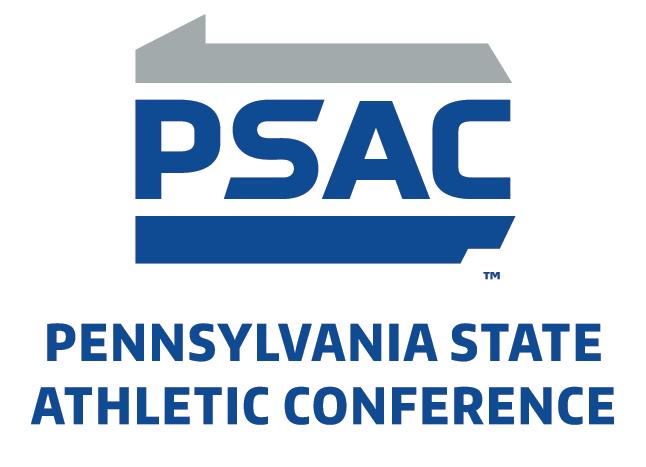
The Shepherd Athletics Department named athletics award winners for the 2017-2018 year during the spring semester. The honorees were nominated and voted upon by the coaches and administrators of the department.
Senior quarterback Connor Jessop was named Male Athlete of the Year, while senior utility/pitcher Lori Sturgill of the softball team gained Female Athlete of the Year honors.
Jessop, who finished fourth in the Harlon Hill award balloting, completed 240-of-294 passes for 3,532 yards and 40 touchdowns in 2017. He also rushed 61 times for 355 yards and six scores. He set Shepherd single-season marks for total offense (3,887), passing touchdowns, touchdowns responsible for (47), and points responsible for (282). Jessop ranked second nationally in passing yards per game (321.1), and points responsible for per game (25.6), while ranking third in passing yards, passing touchdowns, points responsible for (282), and total offense (353.4). He also ranked sixth in passing efficiency (167.4). Jessop was also named Shepherd’s Outstanding Male Athlete as part of Student Recognition Day.
Sturgill gained first team National Fastpitch Coaches Association and second team D2CCA All-Region honors in 2018. She was second on the team with a .345 batting average with 51 hits in 148 at-bats. She drove in 16 runs and scored 21. Sturgill added six doubles and three triples while being successful in 11-of-14 stolen base attempts. She led the Rams in the circle with a 14-9 mark with a 1.81 ERA in 139.0 innings. She fanned 95 and walked 50.
Senior forward AJ Carr of the men’s basketball team was named the Senior Male Athlete of the Year, while senior guard Morgan Arden of the women’s basketball team gained Female Senior Athlete of the Year accolades.
Carr gained first team All-MEC honors for the second consecutive season as he averaged team bests of 15.9 points and 8.6 rebounds in 2017-2018. Carr finished his career with 1,519 points to rank 14th on the Shepherd all-time scoring list. His 804 career rebounds rank him seventh, while his 273 career assists place him 17th on the Shepherd all-time list.
Arden gained first team All-MEC honors as she averaged 22.0 points, 3.5 rebounds, and 4.0 assists in 2017-2018. Arden completed her career as Shepherd’s all-time leading scorer with 1,995 points. Her 393 career assists rank her fourth, while her 165 career steals place her 11th on the Shepherd all-time list. Arden’s 152 career three-pointers rank her second on the Shepherd all-time list. She earned second team D2CCA All-Region and CoSIDA Academic All-District honors. Arden also earned Outstanding Female Athlete honors as part of Student Recognition Day.
Shepherd employees Joyce Cabral, director of financial aid; Kristen Lorenz ’10 and ’18 M.B.A., director of admissions; Jennifer Sealy ’17 M.B.A., associate director of admissions; and Shannon Zimmerman, associate registrar for records, were the recipients of the Ram Award, given to individuals who exemplifies the ideals of NCAA Division II (Passion-Balance-Resource-
ABOVE FROM LEFT: Lori Sturgill, AJ Carr, and Morgan Arden were honored as athletes of the year by the Athletics Department.
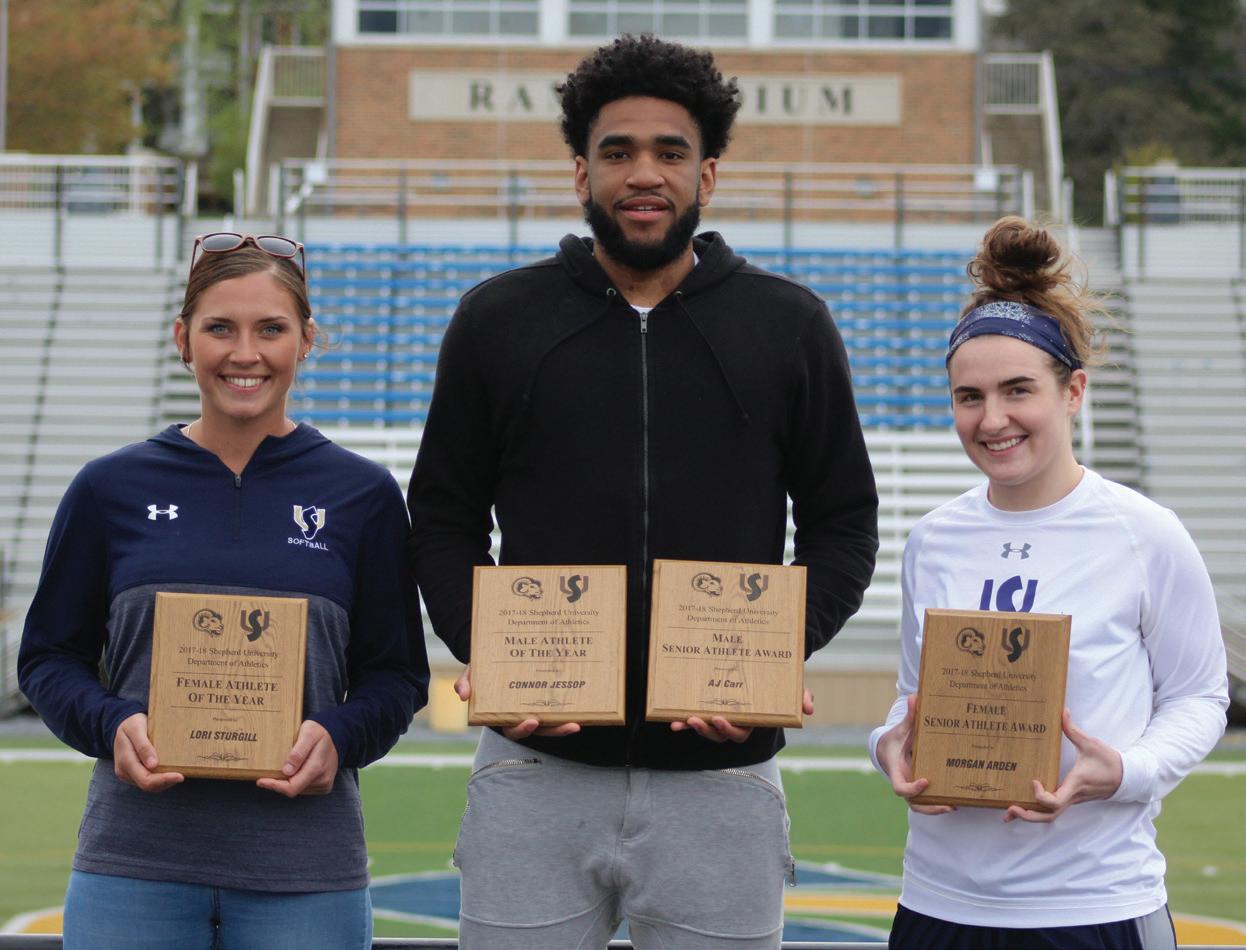
RIGHT: Monte Cater, pictured with Athletics VP Chauncey Winbush ’95 and ’00, was named Coach of the Year.
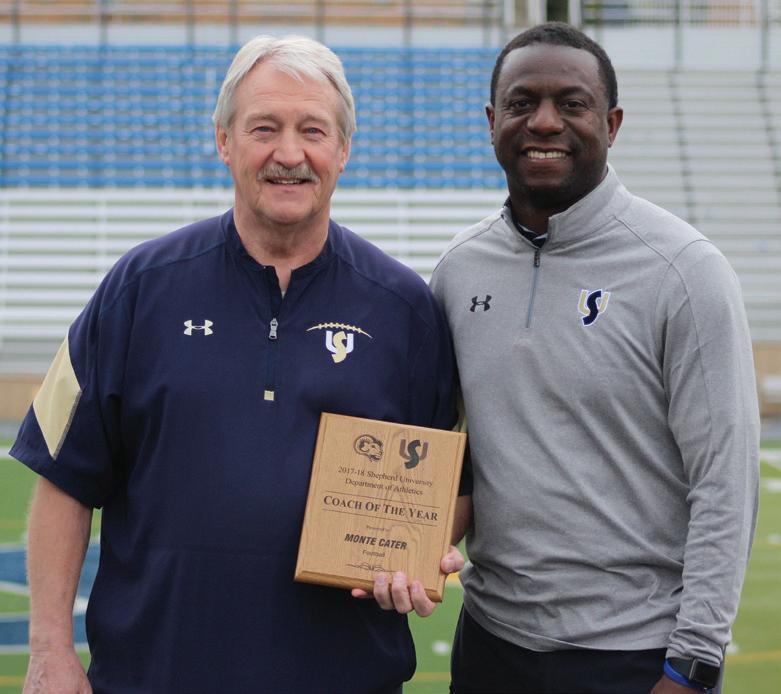
fulness-Service-Learning-Sportsmanship). The four were recognized for their assistance with the process of recruitment of student-athletes.
Head football coach Monte Cater, who led the Rams to a 10-1 mark, gained Coach of the Year honors. He guided Shepherd to its third consecutive undefeated regular season and third straight Mountain East Conference title. Cater, who announced his retirement in January, amassed a 245-93-1 (.724) record in his 31 years as head coach for the Rams. He was the winningest active NCAA (all levels) football coach at the time of his retirement with 274 career victories. ■ Chip Ransom
Head baseball coach Matt McCarty ’10 reached the 200win mark for his career when Shepherd handed Virginia State a 13-3 setback on April 17 at Fairfax Field. ■
Sophomore Owen Elliott, senior Brandon Dang, and sophomore Mike Graessle were named to the All-MEC Men’s Golf Team. Elliott garnered first team honors, Dang was a second team selection, while Graessle grabbed honorable mention accolades. Elliott also represented Shepherd at the 2018 NCAA II Men’s Golf Atlantic/East Regional where he tied for ninth place individually. ■
Chip RansomThe baseball team completed the 2018 season with a 38-17 overall mark with a 27-5 record in conference play. The Rams were the MEC North Division champions and finished as the tournament runner-up. Shepherd qualified for NCAA II postseason play for the third consecutive season.
Seven members of the baseball team were named to the
2018 All-MEC Team. Additionally, sophomore outfielder Brenton Doyle was named MEC Player of the Year, while head coach Matt McCarty ’10 was named MEC Coach of the Year. Junior outfielder Nick Atkinson, junior designated hitter Brian McCourt, junior pitcher Ryan Potts, junior first baseman Justin Smith, sophomore utility Christian Hamel, and Doyle were first team selections, junior catcher Eddie Nottingham was a second team choice, and Smith also garnered honorable mention honors as a pitcher.
Doyle was an offensive force for the Rams hitting .415 on the year. Doyle’s 98 hits this season are an MEC single-season record. He also topped the league with 68 RBI and 165 total bases and was second in the conference in runs scored (65) and slugging percentage (.699). Doyle was 22-of-23 in stolen bases. He was a four-time MEC Player of the Week and a two-time NCBWA Atlantic Region Player of the Week.
McCarty was named MEC Coach of the Year after directing Shepherd to a third-straight MEC North Division title and his fifth-straight regular season league championship. The Rams finished the regular season with an overall record of 34-13, and their 27 conference wins are the most since the league went to divisional play in 2015.
Atkinson batted .347 with 75 hits in 216 at-bats. He has driven in 42 runs and scored a team-best 66. Atkinson added 14 doubles and team bests of six triples and 16 home runs. He was 19-of-21 in stolen bases.
McCourt was fourth on the team with a .354 batting average with 34 hits in 96 at-bats. He drove in 26 runs and scored 22. McCourt added five doubles, a triple, and six home runs.

Potts topped the Rams on the mound with an 11-2 mark and a save with a 2.90 ERA. He fanned 118 in 102.1 innings. Potts led the MEC in wins (11) and strikeouts (118), and innings pitched.
Smith led the team with a .426 batting average with 60 hits in 141 at-bats. He drove in 43 runs and scored 41. Smith added 10 doubles and 13 home runs. He also boasted a 7-2 record on the mound with a 5.98 ERA. He fanned 37 in 55.2 innings.
Hamel had a .350 batting average with 63 hits in 180 atbats. He drove in 57 runs and scored 50. He added a team-best
18 doubles, a triple, and 13 home runs.
Nottingham was third on the team with a .366 batting average with 48 hits in 131 at-bats. He drove in 29 runs and scored 32. He added five doubles, a triple, and four home runs.
The softball team recorded a 34-20 overall mark with a 22-10 record in conference play. The Rams won the MEC North Division title and made their second consecutive regional appearance. Four members of the Shepherd University softball team were named to the 2018 All-MEC Softball Team. Junior outfielder Kaitlyn Konopka and junior pitcher/utility Lori Sturgill were first team selections, while senior pitcher Kaitlin Munda and freshman second baseman Leann Brown were named to the second team.
Konopka, a first team selection for the second consecutive season, was third on the team with a .344 batting average with a team-best 65 hits in 189 at-bats. She drove in 16 runs and scored 29. Konopka added nine doubles and a pair of triples. Konopka paced the team in stolen bases with 16 in 21 attempts.
Sturgill was second on the team with a .345 batting average with 51 hits in 148 at-bats. She drove in 16 runs and scored 21. Sturgill added six doubles and three triples while being successful in 11-of-14 stolen base attempts. She topped the Rams in the circle with a 14-9 mark with a 1.89 ERA in 139.0 innings. She fanned 95 and walked 50.
Munda posted a 10-7 overall mark with a 2.26 ERA in a team-high 139.1 innings. She has fanned a team-high 116 and walked 41. Munda, a first team choice in 2016, earned All-MEC honors for the second time in her career.
Brown led the Rams with a .346 batting average with 62 hits in 179 at-bats. She scored a team-best 32 runs and drove in 22. Brown led the team with 10 doubles and added a home run.
The women’s lacrosse team finished the season with an 8-7 overall mark with 3-2 record in conference play. The Rams advanced to the MEC Tournament finals for the fourth consecutive year.
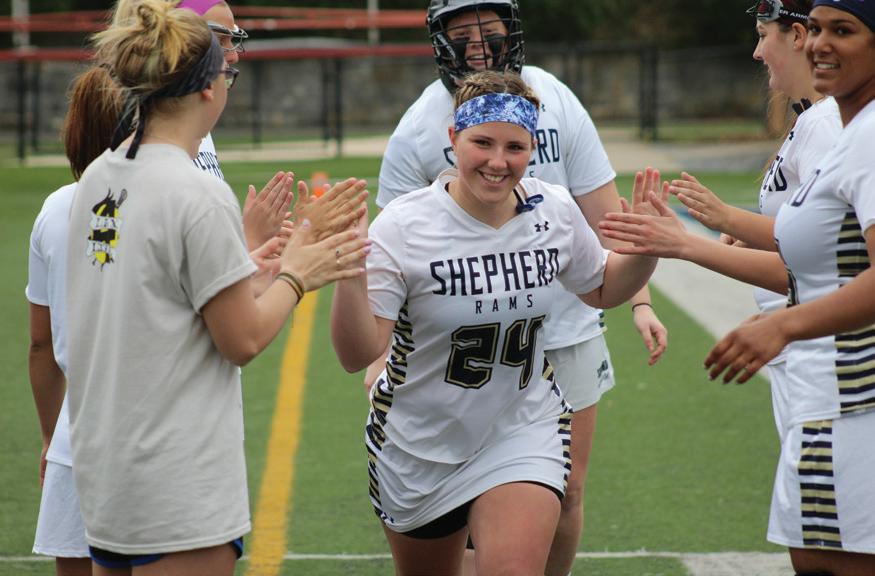
Seven members of the women’s lacrosse team were named to the 2018 All-MEC Women’s Lacrosse Team. Additionally, sophomore attacker Lillian Funke was named MEC Offensive Player of the Year. Funke and senior defender Anna Munford were
first team selections, senior midfielder Sarah Wendt was a second team choice, while senior goalkeeper Casey Hickman, sophomore midfielder Elishia Davis, sophomore midfielder Kiana Turner,
(from previous page)
and freshman attacker Regan Brown were named to the honorable mention team. Brown was also named to the All-Freshman Team.
Funke ranked among the top players in the conference in nine different statistical categories. Offensively, she ranked second in the MEC in goals per game (3.27), fourth in points per game (4.20), while ranking sixth in assists per game (0.93). Additionally, Funke topped the league and was 16th in the country in caused turnovers per game (2.40), and also contributed 3.40 ground balls and 4.46 draw controls per game for the Rams.
Munford earned first team honors after gaining second team honors last season. She anchored a Shepherd defense that held five opponents to nine goals or less. Munford had one goal, 36 ground balls, 23 caused turnovers, and six draw controls. She recorded 81 ground balls and 45 caused turnovers over her career.
Wendt gained second team honors as she recorded 37 goals and eight assists for 45 points this season. She added a Shepherd single-season record 75 draw controls, 41 ground balls, and 19 caused turnovers.
Hickman, a second team choice last season, paced the Rams in saves (166) and ground balls (61). She added 11 caused turnovers. She established Shepherd single-game marks for most saves in a game (19, vs. Wheeling Jesuit, 4-20-18) and most ground balls in a game (11, vs. Newberry, 3-13-18). Hickman also holds the Shepherd records for most saves in a season (166, 2017 and 2018) and most saves in a career (350).
Davis had 31 goals and four assists for 35 points on the year. She added 41 ground balls, 39 draw controls, and 23 caused turnovers. Her 31 goals and 39 draw controls were third on the team, while her 20 caused turnovers tied for second.
Turner helped anchor a Shepherd defense that held five opponents to nine goals or less. She had 32 ground balls, 16 caused turnovers, and one draw control on the year.
Brown recorded 23 goals and a team-best 22 assists for 45 points. Her 45 points tied Wendt for second on the team, while her 23 goals were fourth on the squad. She added 18 ground balls and three caused turnovers.
The men’s tennis team recorded an 8-11 overall record with a 2-5 mark in MEC action.

Sophomore Carter Davis was named to the 2017-2018 AllMEC Men’s Tennis Team. Davis, a second team choice in his freshman season, led the Rams at number one singles and number one doubles play. ■ Chip Ransom
Junior outfielder Kaitlyn Konopka and junior utility pitcher
Lori Sturgill of the softball team garnered All-Region honors.
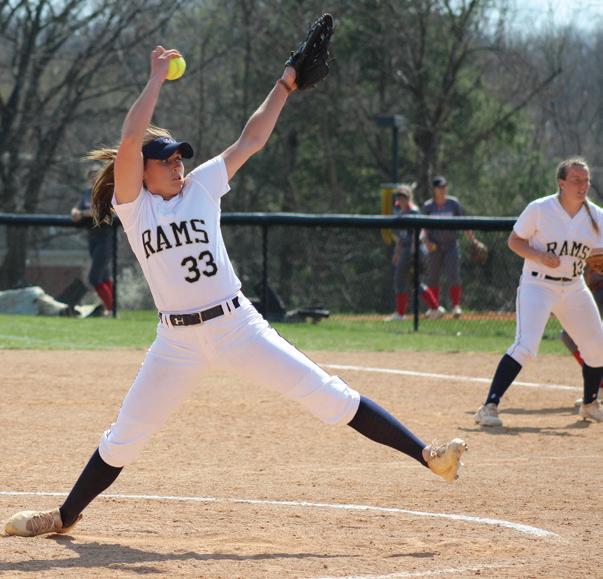
Konopka was named to the D2CCA All-Region Team. She was third on the team with a .344 batting average with a teambest 65 hits in 189 at-bats. She drove in 16 runs and scored 29. Her nine doubles are second on the team, and she also added a pair of triples. Konopka led the team in stolen bases with 16 in 21 attempts.
Sturgill gained first team National Fast Pitch Coaches Association and second team D2CCA All-Region honors. She was second on the team with a .345 batting average with 51 hits in 148 at-bats. She drove in 16 runs and scored 21. Sturgill added six doubles and three triples while being successful in 11-of-14 stolen base attempts. She led the Rams in the circle with a 14-9 mark with a 1.81 ERA in 139.0 innings. She fanned 95 and walked 50. ■
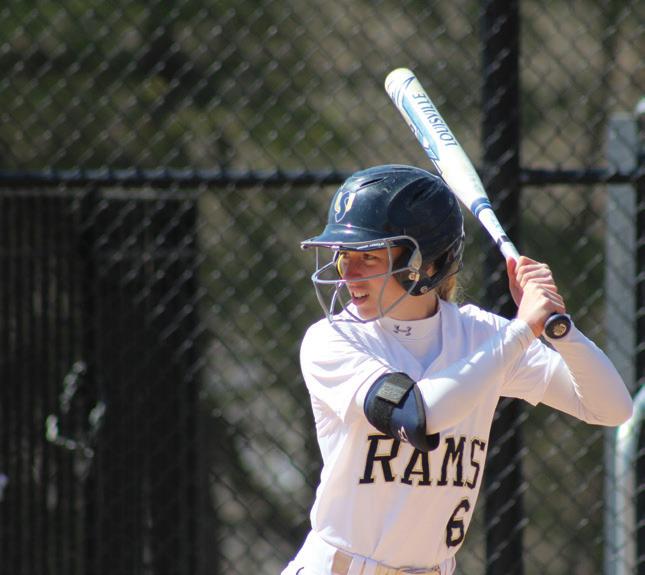
Men’s tennis team senior Austin Thomas was been selected to the 2018 Google Cloud Academic All-America® Division II Men’s At-Large Team.

Thomas, a second team selection, has a 4.00 grade point average as an elementary education major. He gained first team Academic All-District honors as a junior and a senior.
The Academic All-America® program is financially supported by the NCAA Division II national governance structure to assist CoSIDA with handling the awards fulfillment aspects for the 2017-2018 Division II Academic All-America® program. ■
ABOVE FROM LEFT: Lori Sturgill and Kaitlyn Konopka NewsBree Myers ’18 M.B.A had just completed a course in public policy analysis for her Master of Business Administration degree at Shepherd when she began an internship at the National Rural Health Association (NRHA) in the fall semester 2017. The internship in rural health policy was one of two such opportunities sponsored by Dr. Marcia K. Brand for Shepherd students pursuing studies in healthcare and healthcare management. The experience allowed Bree to gain a working knowledge of the coursework she had just studied, along with valuable insight into how rural health policy is shaped.
“Having had this experience, I feel better educated and informed about the healthcare struggles and challenges that fellow West Virginians and Americans face,” said Bree, whose internship experience allowed her to attend hearings on Capitol Hill focusing on the debate surrounding the Affordable Care Act. “As a result, I feel I am more strongly equipped with resources and tools to advocate for others in ensuring health care rights for all Americans, regardless of their zip code.”
Bree, who graduated from the M.B.A. program in May, was one of the first two students to benefit from the rural health policy internship opportunities created by Brand in 2017. Felix Gouanette ’15 of Douala, Cameroon, was also selected for an internship with the NRHA. Felix graduated from Shepherd’s nursing program in 2015 and is currently enrolled in the university’s Doctor of Nursing Practice degree graduate program.
Brand, who formerly served as chair of the Shepherd University Board of Governors, has pledged a 10-year commitment to fund two merit-based internships per year for Shepherd students
who are interested in rural health and health policy. The internships may take place at either of two organizations: the Federal Office of Rural Health Policy (FORHP), which allows students to learn about federal and state programs that exist to support rural communities, or NRHA, which serves as the principal membership organization in the nation for rural health policy. Both organizations regularly host interns and are excited about the opportunity to work with Shepherd.
“It’s important to me that there continues to be a cadre of individuals who understand rural health policy,” said Brand, a native of Martinsburg, who has held a number of leadership positions in the federal government, including serving as director of the FORHP for six years.
Bree shares this sentiment and believes rural health policy is important because it strives for justice for the underserved. Now working toward her master’s degree in elementary education, she plans to apply her knowledge of rural health policy to her teaching career.
“I feel I can take what I’ve learned from my internship experience and use it to advocate for children and families and communities in general,” she said. “It was such an interesting and unexpected opportunity, and I want to thank Dr. Brand for the experience and for her generosity in sponsoring it. I think it’s going to be a positive experience for everyone who takes part in it.”
For Dr. Laura Clayton, professor of nursing education, the graduate ceremony during Shepherd University’s 145th Commencement on May 5 was an especially poignant affair, as she watched members of the inaugural class of the Doctor of Nursing Practice (D.N.P) degree program receive their diplomas. As coordinator for the program’s family nursing leadership concentration, Clayton had not only supervised the nine graduating students, she had also known many of them as undergraduates at Shepherd.
“It was really neat to watch the May graduates because I felt like they were my babies,” said Clayton, who joined Shepherd’s nursing faculty in 1993 and was involved in the planning and launch of the D.N.P program in 2015.
Created as an alternative to researchfocused doctoral programs, the D.N.P. program trains family nurse practitioners and nurse leaders. It is designed to advance professional nursing roles in clinical practice by producing leaders who embrace health care reform and are advocates for vulnerable populations.
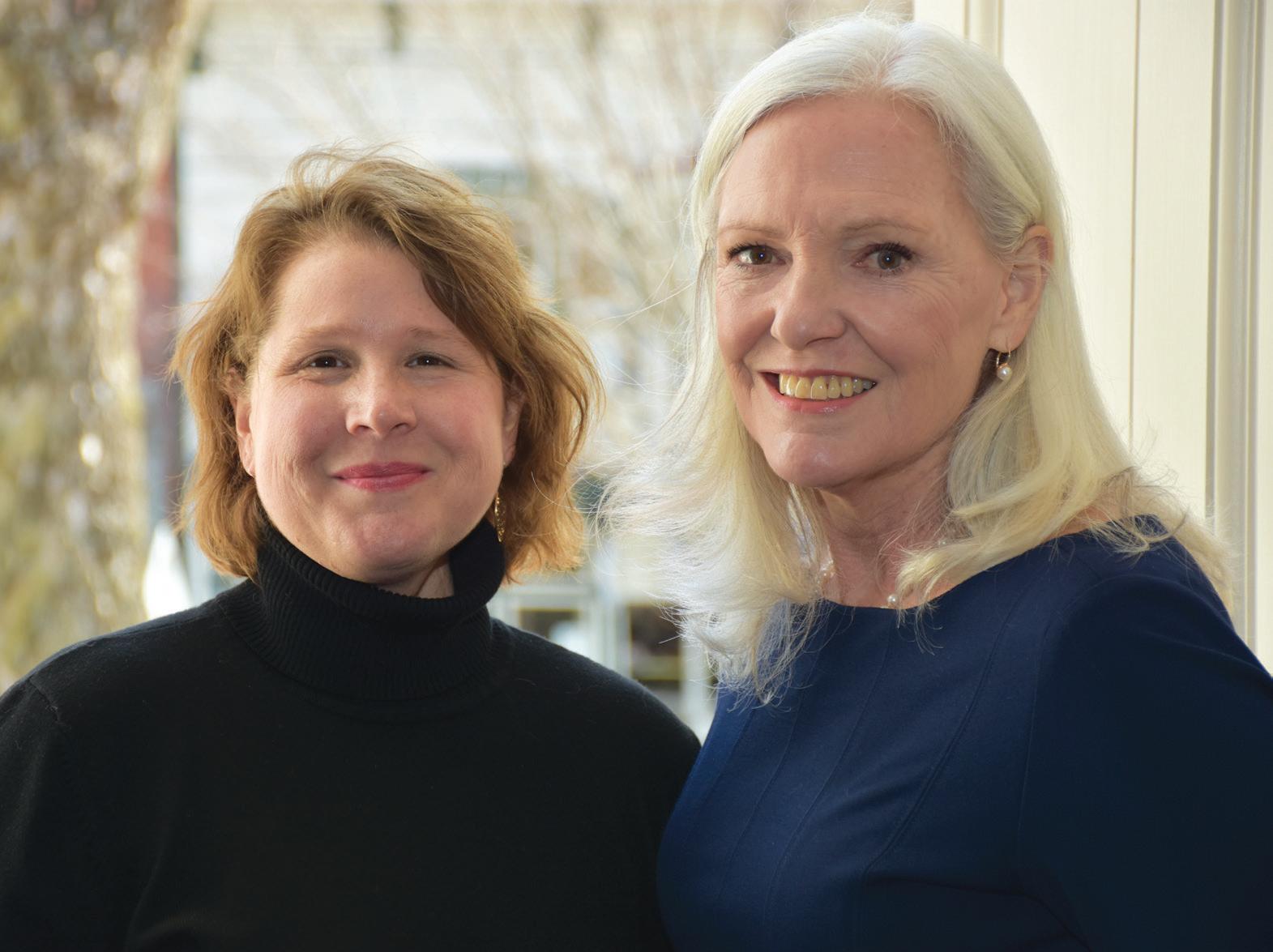
LEFT: Members of the first Doctor of Nursing Practice graduating class, pictured with their professors, are (front row, l. to r.) Dr. Laura Clayton, professor of nursing education; Cara Burker, Barbara Sherman, Amanda Mills, Sarah Cave, and Dr. Doris Burkey, assistant professor of nursing education, second row, Stephen Johnston, Margaret Kenny, John Considine, Caroline McLeod, and Andrew Keel.
“We really wanted to reach out and meet the needs of our community,” said Clayton. “There is a physician shortage in our area since a lot of people don’t want to come to rural areas to practice medicine, and nurse practitioners can help fill that need.”
In addition to being the first to graduate from the D.N.P. program, the 2018 class also holds the distinction of being Shepherd University’s first-ever class of doctoral graduates. The three-year, full-time graduate program integrates theory and practice in areas of health policy and law, administration, business, evaluation systems, population health, and evidence-based practices, requiring more than 1,000 hours of practicum experience. It was this practicum requirement that inspired Clayton to make a gift through the Shepherd University Foundation to assist her students.
“In their third and final year of the program, D.N.P. students are required to implement a program or intervention that deals with an outcome of a need within the population,” Clayton said. “This can be costly, so I wanted to assist the students with offsetting that cost.”
She made her first gift in 2017 to assist the inaugural D.N.P. students during their third-year projects and plans to continue funding the award for subsequent cohorts.
“I feel it’s a way that I can give back,” said Clayton, who remains grateful to her nursing education mentors throughout her undergraduate and graduate training. “Almost all of our doctoral students are working and going to school full time— and most of them have families. That’s really difficult. So, if I can give them a little bit of money to help offset the cost of their final projects, then I’m happy to do that.”
“I’m giving back to those who can make a difference in the overall health of our area,” she said. “To me, that’s important.”
The creation of the Doctor of Nursing Practice (D.N.P.) doctoral program and the recruitment of students to participate in rural health policy internships are just two of the ways Shepherd University’s Department of Nursing Education is seek-
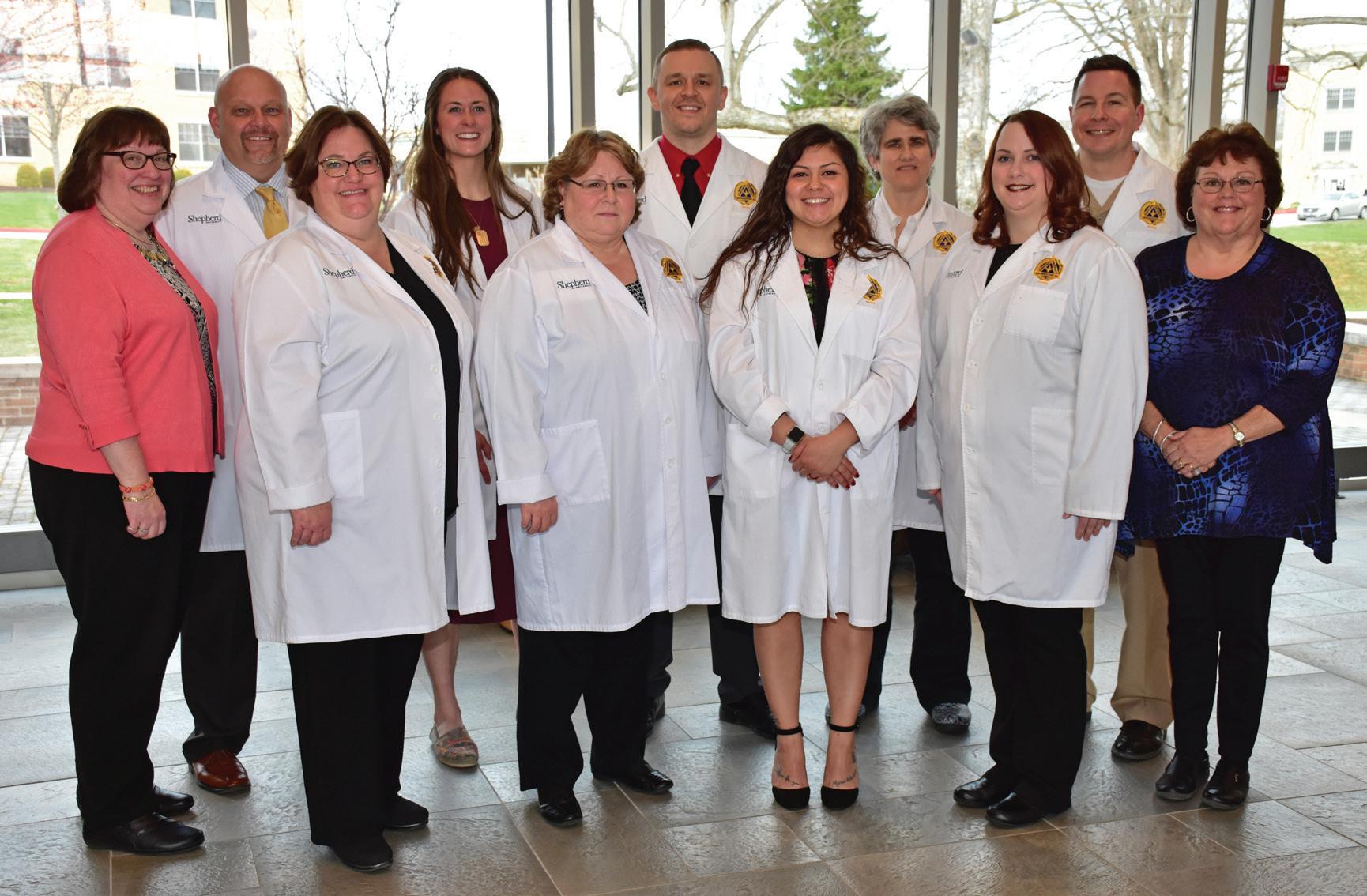
ing to embrace health care reform for vulnerable populations. A $10,000 gift from the West Virginia University Medicine University Healthcare Foundation to the Shepherd University Foundation will be matched by the Shepherd Success Fund for a total impact of $20,000 to support the nursing department.
According to Dr. Sharon Mailey, chair of the Department of Nursing Education and acting dean of the College of Education and Professional Studies, the private contributions will be used to purchase an abdominal simulation trainer and a ventilator, and will fund special projects in the department.
“Partnerships with our community agencies allow Shepherd to stay on the leading edge of care as we prepare our students for the professional workforce,” said Mailey. “The Berkeley Medical Center collaborative allows our students to obtain the most current training tools to enhance skill sets for practice.”
Additionally, nursing education faculty are partnering with the Shepherd University Foundation on a committee to discuss further development opportunities for the nursing department. The partnership follows the creation of a Nursing Advisory Council made up of leaders in the regional healthcare industry to advise the nursing program of healthcare needs and community trends.
There are also plans to distribute an alumni newsletter twice a year to inform nursing graduates of new initiatives and raise awareness for additional needs within the nursing department. Privately funded gifts through the Shepherd University Foundation can help make a difference in the lives of Shepherd nursing students, who in turn make a difference in the communities they serve.
“Extraordinary gifts aren’t measured by dollar amount,” noted Mailey, “but rather by Shepherd nurses providing the change these gifts enable.” ■ Kristin Alexander
If you would like to make a gift of any size to Shepherd University and help make a difference in the lives of deserving Shepherd students, the Foundation stands ready to help. Please contact Monica Lingenfelter, executive vice president of the Foundation, at 304-876-5397 or mlingenf@shepherd.edu.
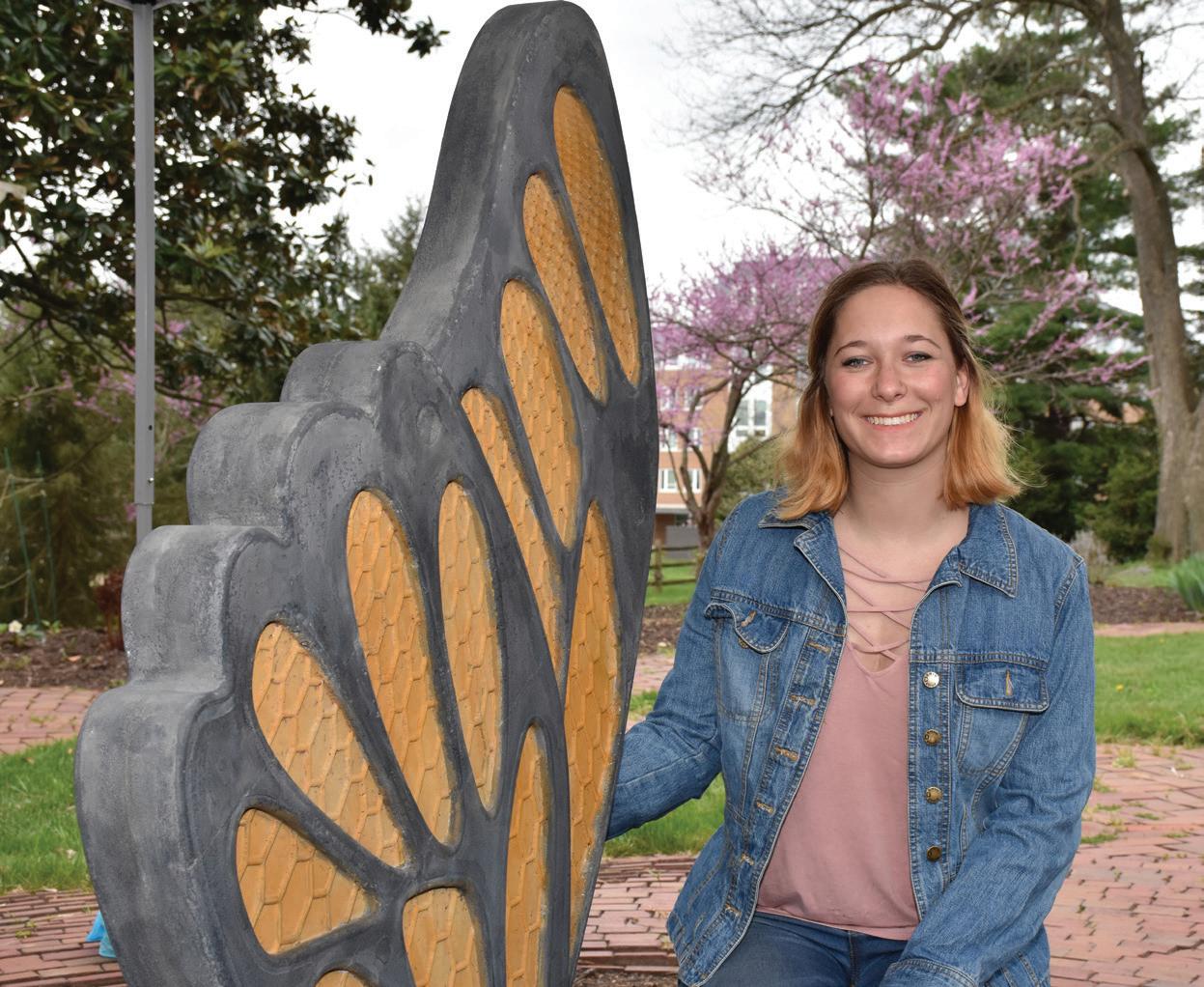
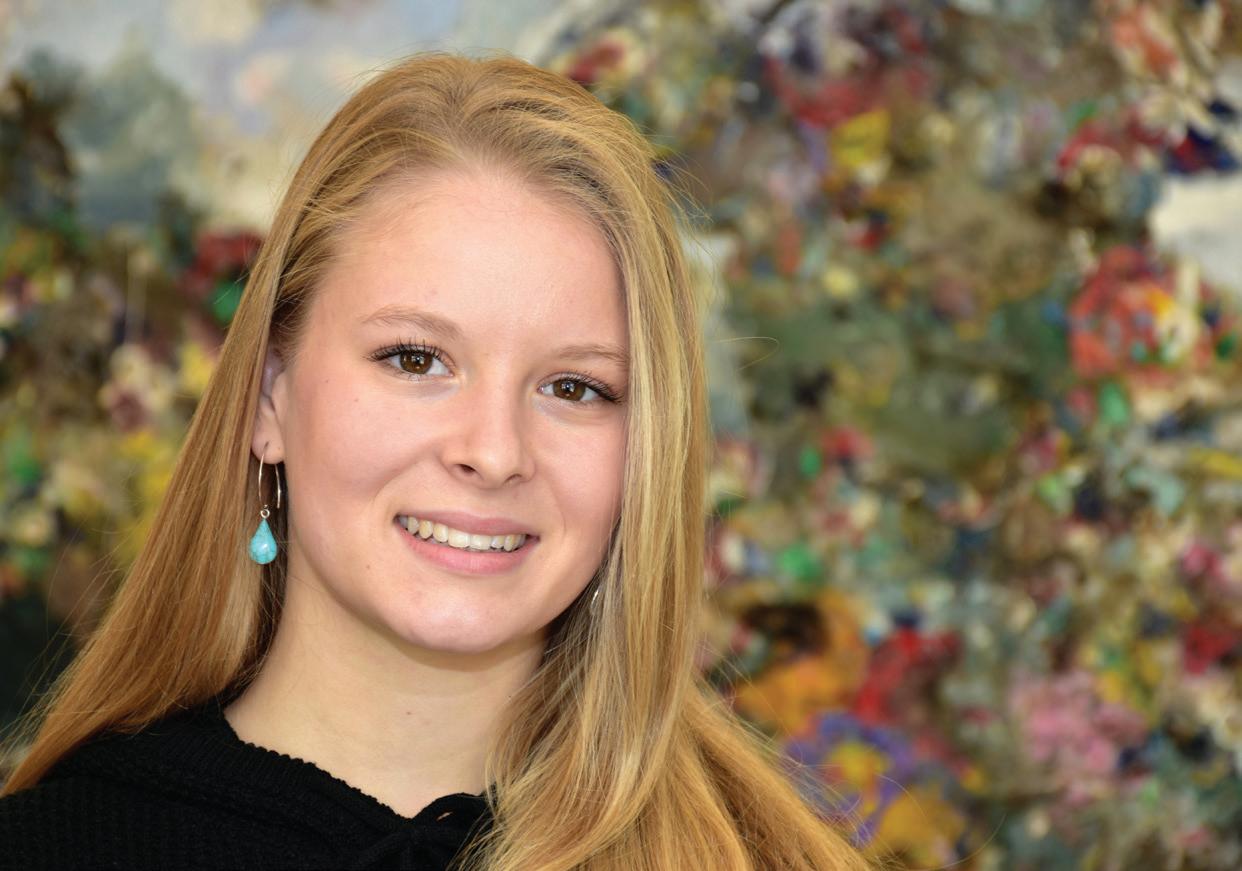
The garden at historic Popodicon now features a sculpture designed by Shepherd alumna and Foundation scholar Alyssa Imes ’18, of Emmitsburg, Maryland. Standing at the center of the formal garden, the four-foot tall profile of a butterfly wing incorporates features of both the monarch butterfly and honeybee, representing the garden’s importance to pollinators. The sculpture was commissioned by the Friends of Popodicon following the group’s award of a $500 grant from The Monarch Alliance, a program of the Potomac Valley Audubon Society. Shepherd is one of seven entities that received grants from The Monarch Alliance this year. The Friends of Popodicon will also use grant monies to purchase plants needed for monarch butterflies to feed, rest, and procreate.
“I like knowing that I’m leaving something of myself behind on Shepherd’s campus,”said Alyssa, who graduated in May with a B.F.A. degree with a concentration in sculpture.
LEFT: Alyssa Imes ’18
Foundation scholar’s original song featured in Hallmark Channel movie
Music major and Foundation scholar Lucia Valentine had her song Magic featured in the Hallmark Channel’s April 7 premiere of Once Upon a Prince. Magic is one of 10 original songs featured on Lucia’s 2016 debut album.
“I submitted all my songs to a licensing agency called Taxi Music,” Lucia said. “They were accepted into their catalog to be licensed for TV shows, commercials, and movies. Hallmark Channel picked up one of the songs, which was really exciting. It played in the opening scene in the movie as the song the girl was listening to while driving her car.”
Lucia is the recipient of the James and Katherine Moler Scholarship. Her album is available through her website, www.luciavalentine.com, as well as on iTunes and Spotify.
LEFT: Lucia Valentine
On May 18, Ron and Lyn Widmyer hosted a parlor performance at their Charles Town farm in support of Shepherd University’s All-Steinway Music Campaign.
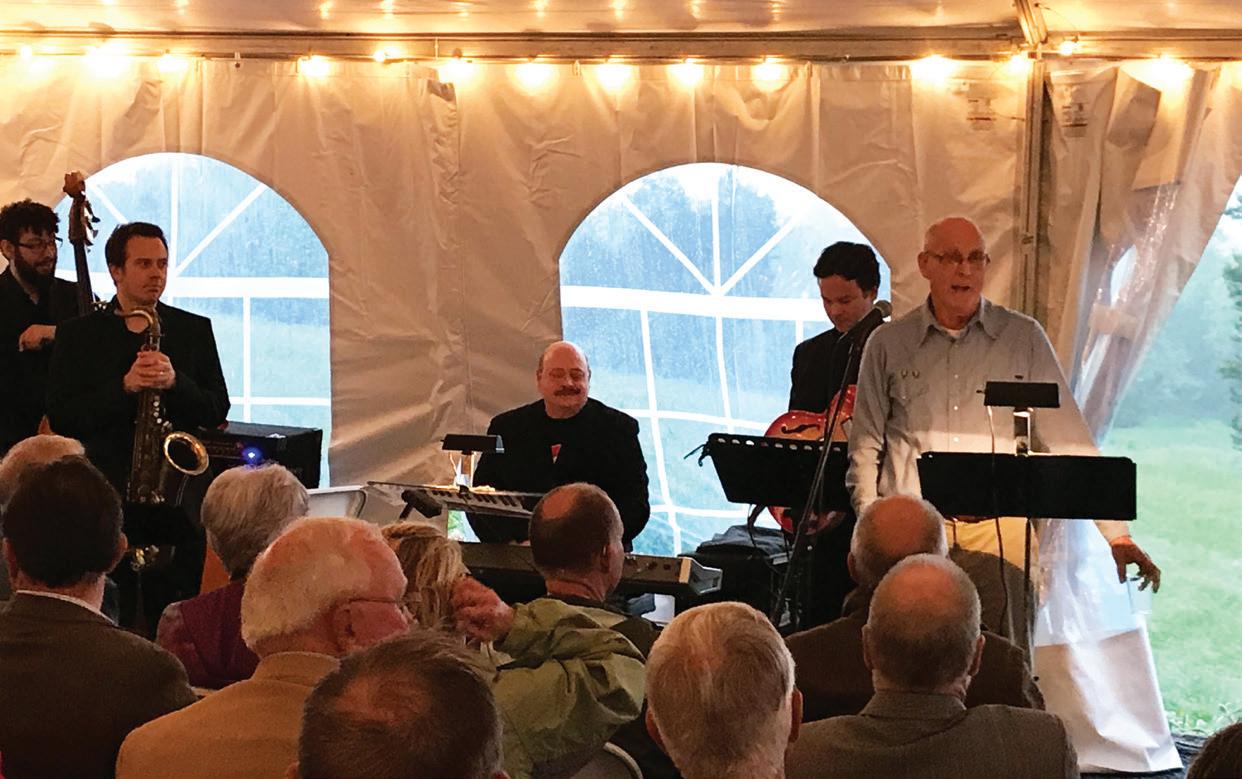
The event marked the All-Steinway Music Campaign’s third parlor performance of the year. Attendees enjoyed musical performances by Shepherd faculty and guest performers and learned what it means for Shepherd to achieve the All-Steinway designation.
To learn more about the All-Steinway Music Campaign, visit shepherduniversityfoundation.org and click on Areas of Support and select Current Giving Priorities.
LEFT: Parlor performance host Ron Widmyer introduces the performers.
Five new members were welcomed into the Joseph P. McMurran Society at the organization’s annual dinner on April 21. Hosted by President Mary J.C. Hendrix ’74 and sponsored by the Shepherd University Foundation, the annual event brings together society members and their guests, along with Shepherd faculty and administrators, to honor those who have chosen to share their lifelong financial achievements with the university through estate and other planned gifts.
This year, Foundation President Christopher S. Colbert ’95 welcomed new members Bonnie and Gerald W. Dodson’77, Lynn E. Leatherman ’92, and Richard S. and Barbara K. Nickell ’52 into the Joseph P. McMurran Society. President Hendrix extolled society members as forward-thinking philanthropists, stating “Because of your generosity, your legacy will live on through those who benefit from your charitable contributions. With the generous and thoughtful investment of people like you, Shepherd’s future is bright.”
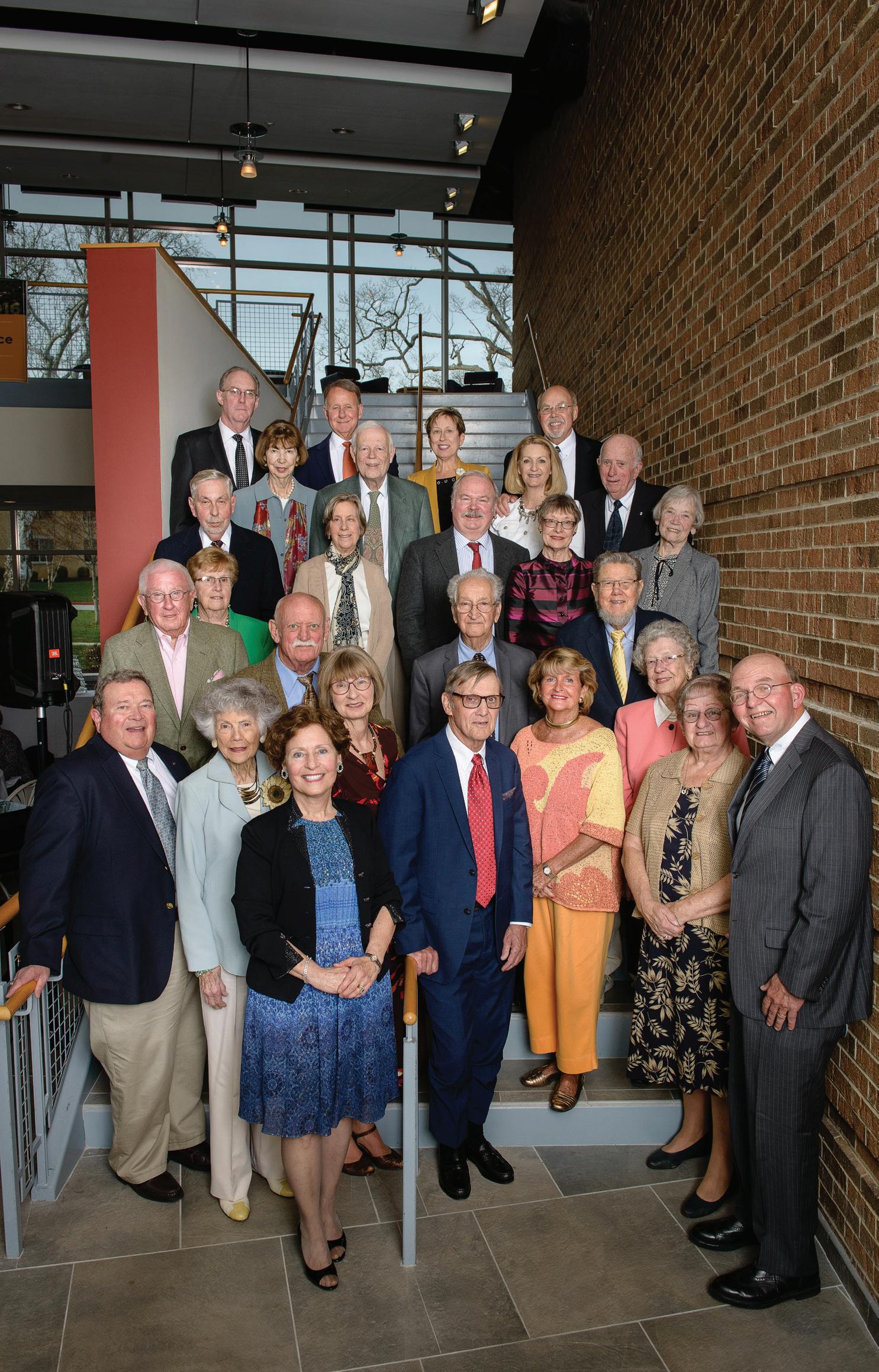
LEFT: Members of the Joseph P. McMurran Society gathered in the atrium of Erma Ora Byrd Hall for the organization’s annual dinner reception. Front row (l. to r.) are Karl Wolf, Jean Carper, Mary J.C. Hendrix, Susan Mentzer-Blair, Al Lueck, Sara Lueck, Betty Lowe, Bonnie Dodson, and Gerald Dodson, second row, Paul “Soupy” Hillyard, Jo Hillyard, William “Bill” Blair, Erdem Ergin, and Thomas Banks, third row, Tom Miller, Mary Bell, Anders Henriksson, Ann Henriksson, and Barbara Nickell, fourth row, Pat Egle, Jack Egle, Monica Lingenfelter, Richard Nickell, top row, Lynn Leatherman, Dan Starliper, Joan Starliper, and Bill Lingenfelter.
Monica Lingenfelter
Executive Vice President 304-876-5397 mlingenf@shepherd.edu
Sherri Janelle
Executive Director of Development 304-876-5043 sjanelle@shepherd.edu
Stacy McFarland
Director of Annual Giving 304-876-5526 smcfarla@shepherd.edu
Aaron Ryan
Assistant Athletic Director for External Affairs 304-876-5527 aryan@shepherd.edu
Popodicon has a new, updated catering kitchen and gardens that are friendly to butterflies and bees, thanks to some generous donors and volunteer efforts in the past year by the Friends of Popodicon, a group dedicated to restoring the historic house.
Friends of Popodicon members Pattie ’73 and Paul ’74 Wilmoth led the effort to renovate the kitchen and adjoining laundry and powder rooms. The kitchen, which was last renovated in the early 1980s, got a complete makeover with new flooring that extends into the other two rooms, cabinetry, granite countertops, and professional-grade appliances, which Shepherd’s catering department helped choose.
“I very much enjoyed it because I got to pick out things and colors and talk to the appliance people,” Pattie said. “Paul got the headaches!”
“It was a challenge working in an older house and pulling things together,” Paul added.
New fixtures were installed in the powder room. Cabinetry and the old kitchen refrigerator were repurposed in the laundry room. The Wilmoths, who retired in December 2017, were owners of a custom homebuilding business, which gave them the expertise needed to spearhead the renovation.

“We have good contacts, and I cannot say enough about the number of people who have donated,” Pattie said.
Meanwhile, volunteer Elisabeth Staro has been hard at work outside the house transforming the formal garden into a pollinator waystation designed to attract butterflies and bees.

“The new design by James Dillon, of Native Havens, is centered on bees, butterflies, birds, and native species,” Elisabeth said. “The goal is to nurture nature through all seasons.”
Some money for improvements to the gardens came from winning $500 in a contest for the largest southern magnolia tree in the tri-county area sponsored by West Virginia Delegate John Overington. A $500 grant from The Monarch Alliance
RIGHT: Friends of Popodicon member Elisabeth Staro is overseeing restoration of the historic gardens.
LEFT: The kitchen at Popodicon has a new, professional-grade refrigerator to help with catered events at the facility.

went toward the purchase of pollinator-friendly plants.
The next phase of the garden restoration will include creating a rain garden on the north side of the house. This will help to cover the HVAC units and manage runoff from the roof.
The Friends of Popodicon continue to accept help and donations to complete the kitchen renovation and continue the garden restoration. The house and grounds are available for events such as weddings, parties, and receptions.
For information about the continued need for donations or to make a gift, contact Monica Lingenfelter, executive vice president, Shepherd University Foundation, at mlingenf@shepherd. edu or 304-876-5397. To learn more about reserving Popodicon for an event, contact Sonya Sholley, executive assistant to the president, at ssholley@shepherd.edu or 304-876-5107 or visit the website at www.shepherd.edu/popodicon
■ Cecelia MasonSee all the improvements that have been made to Popodicon! Shepherd will host an open house during the annual Christmas in Shepherdstown on Saturday, December 8, and Sunday, December 9, from 10 a.m.-4 p.m. Admission is by donation to benefit the Friends of Popodicon.
More than 50 alumnae, community members, faculty, and staff attended the Little Black Dress Party: Popping for Popodicon on May 19 at historic Popodicon.

Located on Shepherd’s West Campus, Popodicon serves as the business residence of President Mary J.C. Hendrix. The event was sponsored by Women for Shepherd University and the Shepherd University Foundation and raised funds to support Friends of Popodicon, a group dedicated to the restoration and beautification of the presidential home.
Members of the group were on hand to serve as docents, graciously leading guests on tours of the house and answering questions about their current project—a complete renovation of the kitchen and adjacent powder room. The event also featured a wine pull raffle made possible by donations from local businesses and community members. The Little Black Dress Party was as the 11th marquee event for Women for Shepherd University.
■
Saturday, October 20 • 2-5 p.m. Metal Pour and Lab Tour- FASTEnER Lab, Center for Creative
Alyssa Imes ’18, creator of the monarch butterfly sculpture located at Popodicon, will conduct a metal pour with her iron casting furnace. The pour will take place in conjunction with a tour of the FASTEnER Lab, which will showcase student work. Tickets are $25 and include a scratch block and metal casting. Tickets may be reserved through Friday, October 12, by contacting Meg Peterson, director of donor relations, at 304-876-5021 or mpeterso@shepherd.edu.
Saturday, May 18, 2019 • 2-4 p.m. House and
Women for Shepherd will host a house and garden tour of historic Falling Spring, located in Morgan’s Grove Park in Shepherdstown. Owned by Ed ’84 and Lorri ’84 Schwartz, the estate was built in 1837 by the Morgan family
historical details, including the largest and oldest sugar maple tree in West Virginia. A light afternoon tea
will be served. The event is free and is open to the public. RSVPs are requested by Friday, May 10, to Meg Peterson, director of donor relations, mpeterso@shepherd.edu, 304-876-5021.
For a full list of Foundation-sponsored events, visit shepherduniversityfoundation.org.
and boasts many reception ABOVE: Alumnae, community members, faculty, and staff attended the Little Black Dress Party: Popping for Popodicon May 9 at the historic house on Shepherd’s campus. The event raised more than $2,000 to support the Friends of Popodicon, a group dedicated to restoring and beautifying the house.
The Scarborough Society of Shepherd University has planned an exciting new Scarborough Art and Lecture Series featuring unique topics and speakers relevant to the academic and cultural community. All events are free and open to the public and will take place in the Scarborough Library Reading Room with a reception to follow.
x Thursday, October 18 • 7 p.m.
Shepherd alumna and 2014 West Virginia Teacher of the Year Erin Sponaugle ’03 (left) will discuss the process of writing and illustrating her children’s book, The Adventures of Berkeley the Bear, and how her background as a teacher influenced the project. A special focus will center on the illustration process and the importance of nurturing creativity in the classroom and beyond. Books and poster prints will be available for purchase.
x Tuesday, January 22, 2019 • 7 p.m.
Gabrielle Tokach, who serves as public relations manager for the Contemporary American Theater Festival, will discuss her process and methods as director of a production of The Miracle Worker at the Apollo Civic Theatre in Martinsburg. A scene from the play will also be performed. The Miracle Worker is slated to run February 1-3 and February 8-10, 2019.

x Thursday, April 4, 2019 • 7 p.m.
Local author and poet Sonja James will perform a poetry reading from her published works, including The White Spider in My Hand, Calling Old Ghosts to Supper, Children of the Moon, and Baiting the Hook
For a full calendar of Foundation-sponsored events, visit shepherduniversityfoundation.org. ■

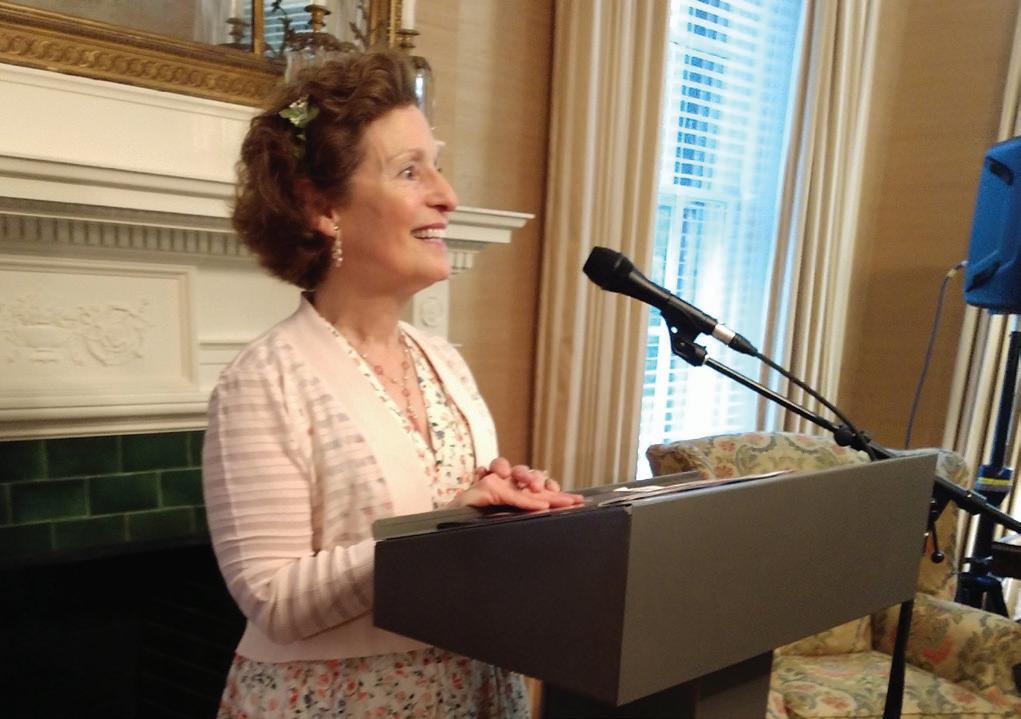
The President’s Club held its annual reception on May 18 at Popodicon. Members in attendance received a report on the impact of their annual giving, which has been instrumental in providing the resources necessary to advance Shepherd’s strategic priorities and help raise the university’s profile through outstanding programs and academics.
The President’s Club donors help ensure the future of Shepherd University through annual unrestricted gifts of $1,000 or more. This commitment shown by members demonstrates the true passion and pride that so many feel for Shepherd.
For more information about the President’s Club, visit shepherduniversityfoundation.org.
The Foundation has launched a new website, created by graphic designer and alumnus Adam Leviton ’07 of Frederick, Maryland. The new site features a more responsive design and interface, as well as an updated content management system. Designed primarily with donors and prospective donors in mind, the site includes several tools and resources for students, faculty, alumni, and friends of Shepherd. Visit the new site at shepherduniversityfoundation.org ■

Inspired by the classic Boris Pasternak novel and film adaptation Doctor Zhivago, the 17th Scarborough Society Gala invited guests into a winter wonderland invoking the imperial majesty of early 20th century Russia. Alumni and community members enjoyed dinner and dancing to the music of the band Souled Out at the elegant event held August 10 at the Bavarian Inn in Shepherdstown. With gratitude, the Foundation acknowledges and thanks those businesses and individuals whose generous sponsorships make this popular summertime event possible each year.

Presenting Sponsors:
BB&T Wealth Management
Bronfman Rothschild Wealth Advisors
Jefferson Security Bank United Bank, Inc. Valley Proteins, Inc.
Band Sponsor: Jerry Williams ’71, State Farm Insurance
Program Sponsor: Argos USA Corporation
Theme Sponsors:
Bowles Rice LLP
Brian Jackson, McMorgan & Company
Ours, Lawyer, Lewis & Co., PLLC
PriceRomine, PLLC
Smith Elliott Kearns & Co.
Stephen Skinner, Skinner Law Firm
More than 40 years ago, Leetown resident Thomas M. Lurry chose to leave the entirety of his estate to Shepherd with the express desire to “aid and assist deserving students in furthering their education at Shepherd.” His deferred gift would go on to establish a general academic scholarship award in support of West Virginia residents who display financial need and academic success.
Since its creation, the Thomas M. and Sherry E. Lurry Scholarship has assisted countless deserving students, including Adrienne Newlon Zavala ’04, who completed her undergraduate
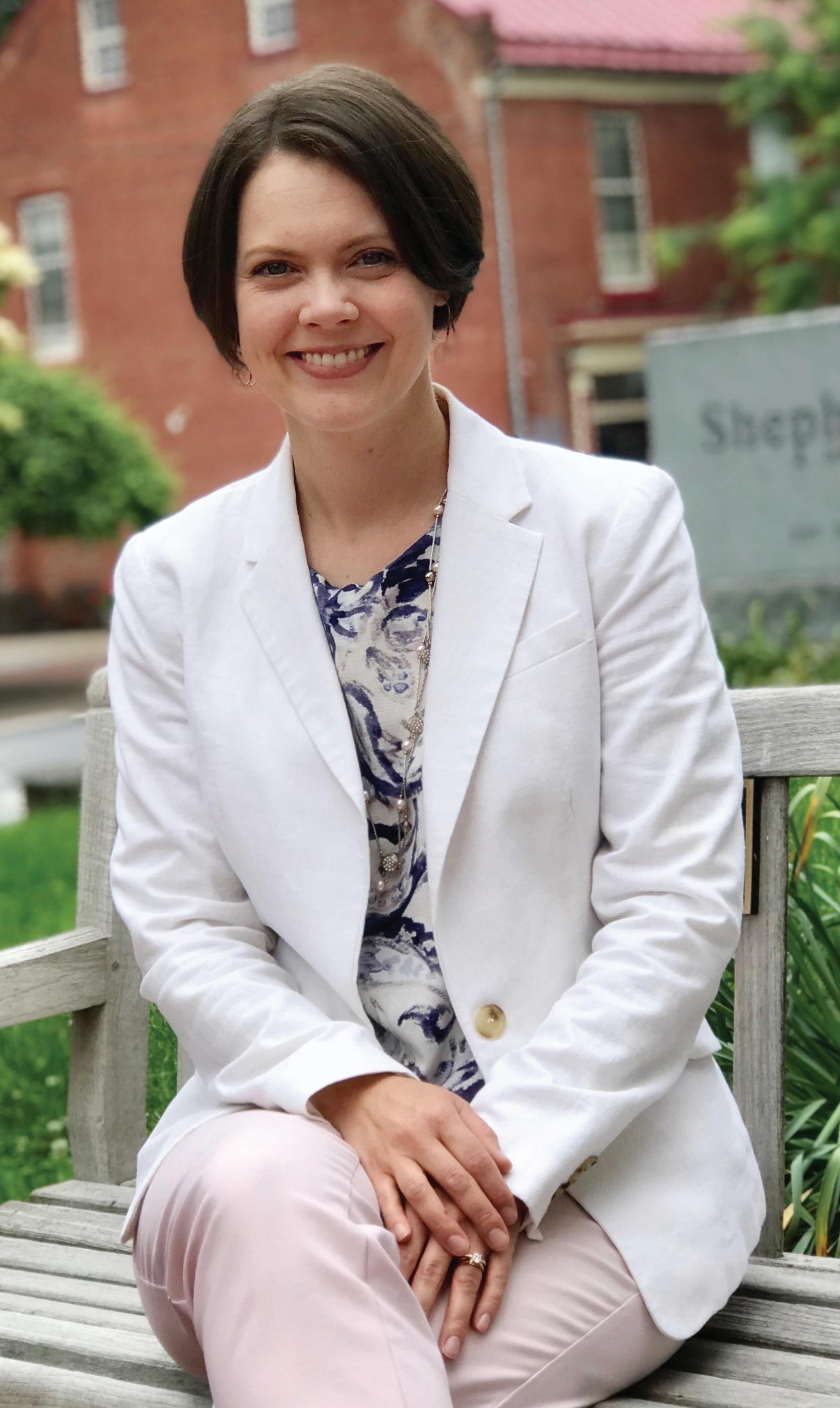
degree in biology at Shepherd before entering West Virginia University School of Medicine. During her time at Shepherd, Adrienne helped to fulfill Thomas Lurry’s final wish by striving for and achieving academic excellence. In addition to receiving two additional scholarships through the Shepherd University Foundation—the Captain Charles N.G. and Jessie S. Hendrix Memorial Scholarship and the Rubye Clyde McCormick Scholarship—Adrienne was also a McMurran Scholar, Shepherd’s highest academic honor.
“I had an excellent experience at Shepherd. It was the perfect fit for me and more than adequately prepared me for medical school,” said Adrienne, who credits her scholarships, as well as her parents, with helping her graduate from Shepherd debt free. “I had no debt going into medical school,” she said. “That was huge to me.”
A native of Charles Town, Adrienne trained at Harpers Ferry Family Medicine, a primary care facility affiliated of WVU Medicine. The clinic facilitates the Rural Scholars Program for fourthyear medical students and serves as home base for WVU’s Rural Family Medicine Residency Program. Adrienne considers herself privileged to have participated in both programs.
“Ever since I was a little kid, I knew I wanted to be a doctor and always planned to come home and serve my community in Jefferson County,” she said. “It’s such a beautiful place to live with such a strong sense of community.”
Staying true to her childhood aspirations, Adrienne currently works as a family practitioner at Harpers Ferry Family Medicine, where she also serves as faculty in the same residency program in which she trained. At the same time, she feels blessed to be raising her two sons, ages 6 and 11, with her husband, Hector Zavala, four blocks from where she grew up in historic downtown Charles Town.
As a practitioner in rural family medicine and an advocate of the policies that shape it, Adrienne is impressed by the opportunities Shepherd now offers in the areas of rural health policy and practice (see page 22). Her passion for her vocation and hometown community matches that of Thomas Lurry as he resolved to assist deserving Shepherd students like her more than 40 years ago. And like Thomas Lurry, Adrienne is now creating her own legacy in the community in which she lives and works.
“To me,” she said, “there is no higher calling than serving the underserved in a rural community where you grew up.”
■ Kristin AlexanderIf you would like to make a gift of any size to Shepherd University and help make a difference in the lives of deserving Shepherd students, the Foundation stands ready to help. Please contact Monica Lingenfelter, executive vice president of the Foundation at 304-876-5397 or mlingenf@shepherd.edu.
TOP: Scenes from the undergraduate commencement ceremony.
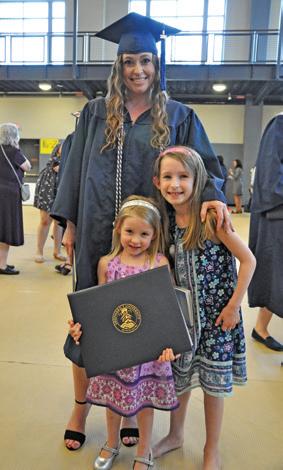
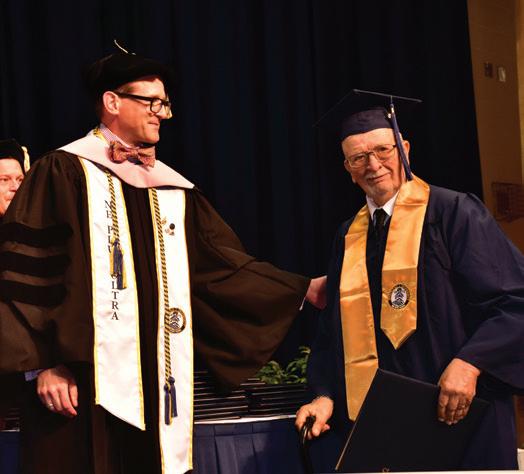
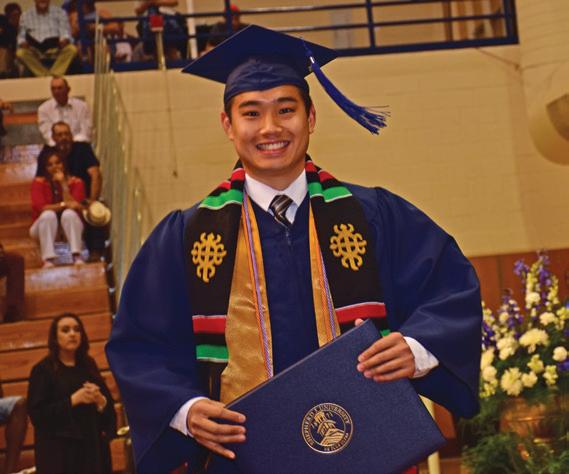
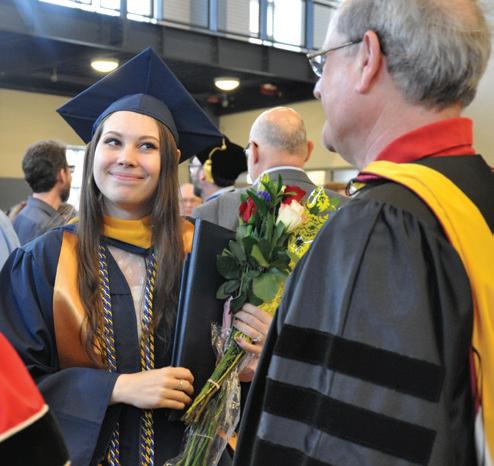
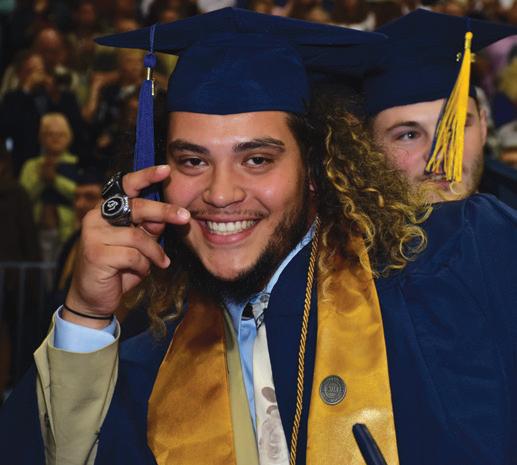

TOP RIGHT: Shepherd University held its 145th Commencement ceremonies on Saturday, May 5. At the graduate ceremony, held at the Frank Center Theater at 11 a.m., master’s and doctoral degrees were awarded to 60 students, including the first doctoral degrees awarded by Shepherd—the Doctor of Nursing Practice degree. Dr. Paul Welch, a physician/nephrologist caring for patients in Berkeley and Jefferson counties and president of the medical staff at Berkeley Medical Center in Martinsburg, delivered the commencement address to the graduate degree candidates. Welch, who was awarded a Doctor of Science honorary degree during the ceremony, provided the funding for the development of the Doctor of Nursing Practice degree at Shepherd. Pictured (l. to r.) are Dr. Chris Lovelace, Welch, Dr. Marcia Brand, and President Mary J.C. Hendrix ’74.
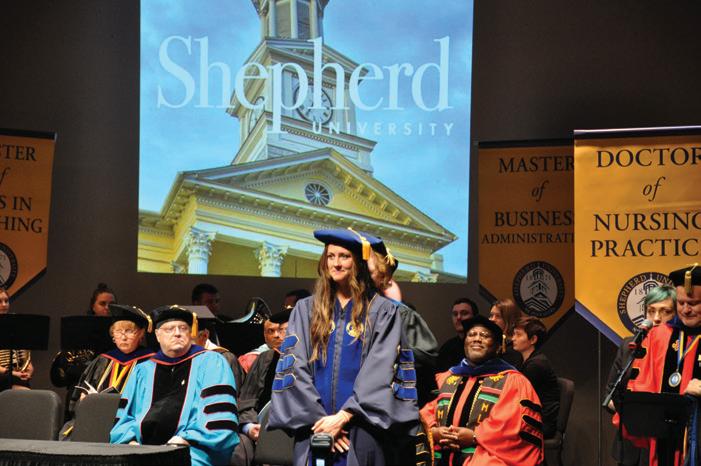
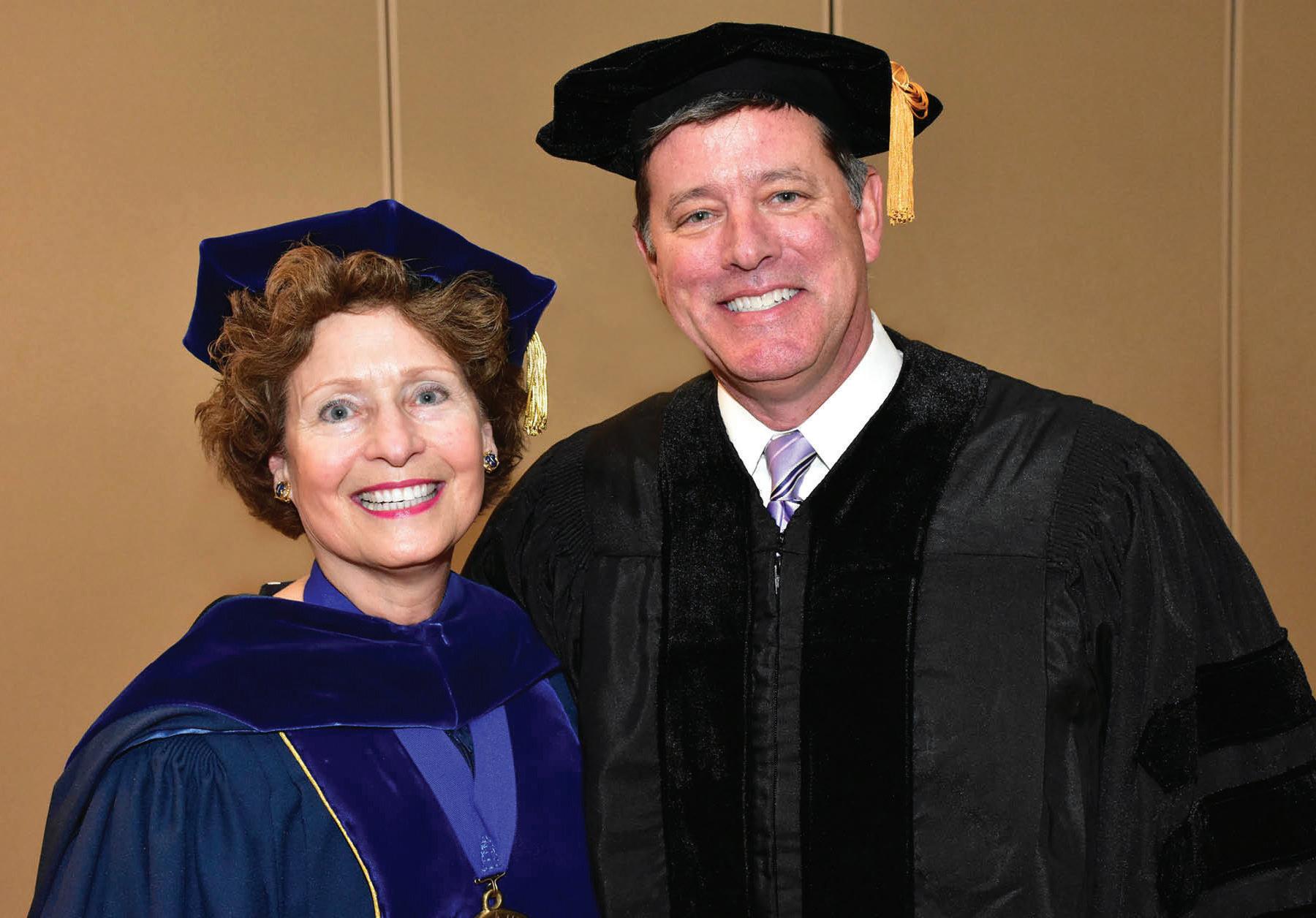
MIDDLE RIGHT: Paul T. McDermott ’83, president and chief executive officer of the Washington Real Estate Investment Trust in Washington, D.C., delivered the undergraduate address at the Butcher Center at 1:50 p.m. He was awarded a Doctor of Business honorary degree during the ceremony. Bachelor’s degrees were awarded to 642 students during the ceremony. McDermott is pictured with President Mary J.C. Hendrix.
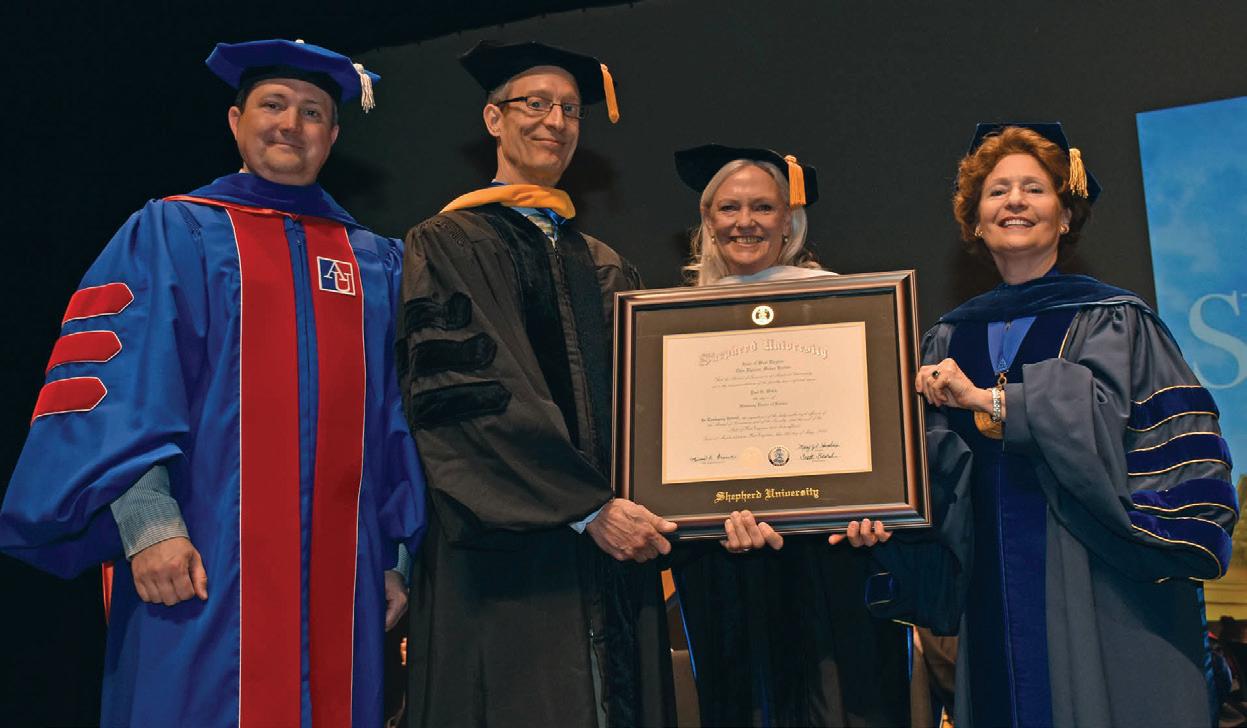
LOWER RIGHT: The Friends of Popodicon, a volunteer group working to bring Popodicon and its gardens back to their original grandeur, were presented the President’s Award for their service to the university. Representing the Friends of Popodicon are (l. to r.) Terry Wells, Anne Small ’67, Tia McMillan, Carol Kable, Marty Kable, Peachy Staley ’70, Sara Lueck ’67, John Miller, Elisabeth Staro, and Jim Staley ’68.
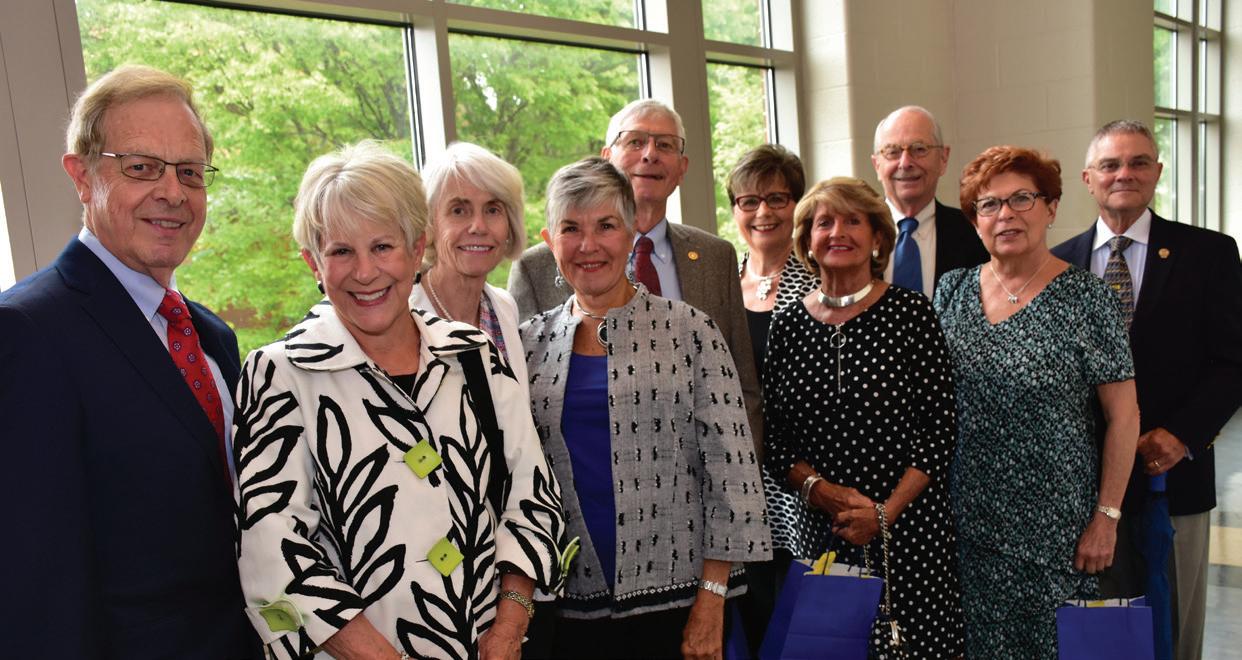
BELOW: Scenes from the graduate commencement ceremony.
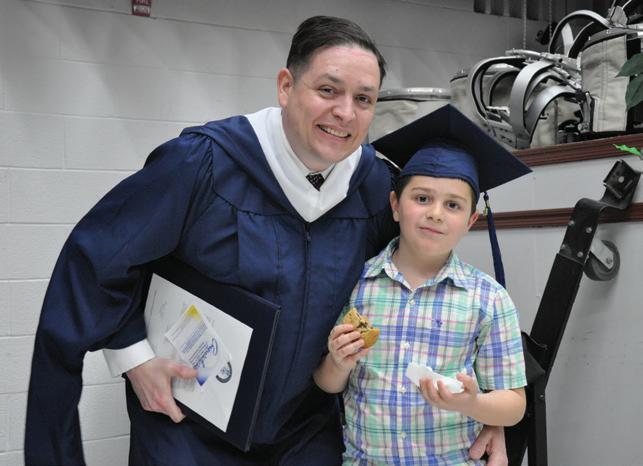



Pennsylvania State Athletic Conference
Commissioner Steve Murray (r.) was welcomed to Shepherd by President Mary J.C. Hendrix ’74 and Chauncey Winbush ’95 and ’00, vice president for athletics, at a June 20 press conference to discuss Shepherd joining PSAC in 2019.
